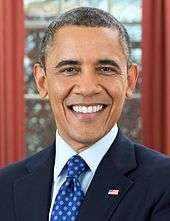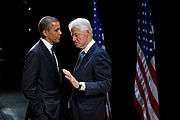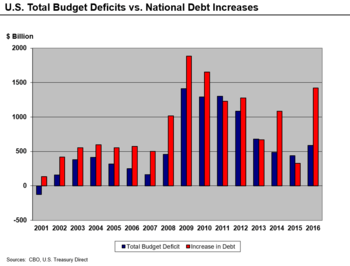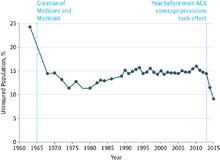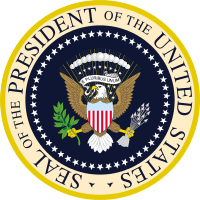Barack Obama
| Barack Obama | |
|---|---|
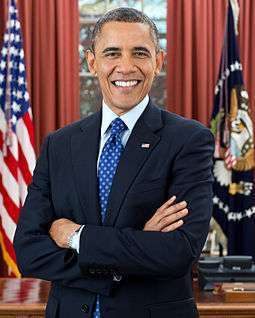 | |
| 44th President of the United States | |
|
Assumed office January 20, 2009 | |
| Vice President | Joe Biden |
| Preceded by | George W. Bush |
| United States Senator from Illinois | |
|
In office January 3, 2005 – November 16, 2008 | |
| Preceded by | Peter Fitzgerald |
| Succeeded by | Roland Burris |
| Member of the Illinois Senate from the 13th district | |
|
In office January 8, 1997 – November 4, 2004 | |
| Preceded by | Alice Palmer |
| Succeeded by | Kwame Raoul |
| Personal details | |
| Born |
Barack Hussein Obama II August 4, 1961 Honolulu, Hawaii, U.S. |
| Political party | Democratic |
| Spouse(s) | Michelle Robinson (m. 1992) |
| Children |
|
| Parents | |
| Residence | White House |
| Alma mater |
Occidental College Columbia University Harvard University |
| Awards | Nobel Peace Prize (2009) |
| Signature |
|
| Website | |
| ||
|---|---|---|
|
President of the United States Policies First term Second term
|
||
Barack Hussein Obama II (US ![]() i/bəˈrɑːk huːˈseɪn oʊˈbɑːmə/ bə-RAHK hoo-SAYN oh-BAH-mə;[1][2] born August 4, 1961) is an American politician who is the 44th and current President of the United States. He is the first African American to be elected to office and the first president born outside the contiguous United States. Born in Honolulu, Hawaii, Obama is a graduate of Columbia University and Harvard Law School, where he was president of the Harvard Law Review. He was a community organizer in Chicago before earning his law degree. He worked as a civil rights attorney and taught constitutional law at the University of Chicago Law School from 1992 to 2004. While serving three terms representing the 13th District in the Illinois Senate from 1997 to 2004, he ran unsuccessfully in the Democratic primary for the United States House of Representatives in 2000 against incumbent Bobby Rush.
i/bəˈrɑːk huːˈseɪn oʊˈbɑːmə/ bə-RAHK hoo-SAYN oh-BAH-mə;[1][2] born August 4, 1961) is an American politician who is the 44th and current President of the United States. He is the first African American to be elected to office and the first president born outside the contiguous United States. Born in Honolulu, Hawaii, Obama is a graduate of Columbia University and Harvard Law School, where he was president of the Harvard Law Review. He was a community organizer in Chicago before earning his law degree. He worked as a civil rights attorney and taught constitutional law at the University of Chicago Law School from 1992 to 2004. While serving three terms representing the 13th District in the Illinois Senate from 1997 to 2004, he ran unsuccessfully in the Democratic primary for the United States House of Representatives in 2000 against incumbent Bobby Rush.
In 2004, Obama received national attention during his campaign to represent Illinois in the United States Senate with his victory in the March Democratic Party primary, his keynote address at the Democratic National Convention in July, and his election to the Senate in November. He began his presidential campaign in 2007 and, after a close primary campaign against Hillary Clinton in 2008, he won sufficient delegates in the Democratic Party primaries to receive the presidential nomination. He then defeated Republican nominee John McCain in the general election, and was inaugurated as president on January 20, 2009. Nine months after his inauguration, Obama was named the 2009 Nobel Peace Prize laureate.
During his first two years in office, Obama signed into law economic stimulus legislation in response to the Great Recession in the form of the American Recovery and Reinvestment Act of 2009 and the Tax Relief, Unemployment Insurance Reauthorization, and Job Creation Act of 2010. Other major domestic initiatives in his first term included the Patient Protection and Affordable Care Act, often referred to as "Obamacare"; the Dodd–Frank Wall Street Reform and Consumer Protection Act; and the Don't Ask, Don't Tell Repeal Act of 2010. In foreign policy, Obama ended U.S. military involvement in the Iraq War, increased U.S. troop levels in Afghanistan, signed the New START arms control treaty with Russia, ordered U.S. military involvement in Libya in opposition to Muammar Gaddafi, and ordered the military operation that resulted in the death of Osama bin Laden. In January 2011, the Republicans regained control of the House of Representatives as the Democratic Party lost a total of 63 seats; and, after a lengthy debate over federal spending and whether or not to raise the nation's debt limit, Obama signed the Budget Control Act of 2011 and the American Taxpayer Relief Act of 2012.
Obama was re-elected president in November 2012, defeating Republican nominee Mitt Romney, and was sworn in for a second term on January 20, 2013. During his second term, Obama has promoted domestic policies related to gun control in response to the Sandy Hook Elementary School shooting, and has called for greater inclusiveness for LGBT Americans, while his administration has filed briefs that urged the Supreme Court to strike down part of the federal Defense of Marriage Act (United States v. Windsor) and state level same-sex marriage bans (Obergefell v. Hodges) as unconstitutional. In foreign policy, Obama ordered U.S. military intervention in Iraq in response to gains made by ISIL after the 2011 withdrawal from Iraq, continued the process of ending U.S. combat operations in Afghanistan, promoted discussions that led to the 2015 Paris Agreement on global climate change, brokered a nuclear deal with Iran, and normalized U.S. relations with Cuba.
Early life and career
Obama was born on August 4, 1961,[3] at Kapiʻolani Maternity & Gynecological Hospital (now Kapiʻolani Medical Center for Women and Children) in Honolulu, Hawaii;[4][5][6] he is the first President to have been born in Hawaii.[7] His mother, Ann Dunham, born in Wichita, Kansas, was of mostly English ancestry.[8] His father, Barack Obama Sr., was a Luo from Nyang'oma Kogelo, Kenya. Obama's parents met in 1960 in a Russian language class at the University of Hawaii at Manoa, where his father was a foreign student on scholarship.[9][10] The couple married in Wailuku on Maui on February 2, 1961,[11][12] and separated when, in late August 1961, Obama's mother moved with their newborn son to attend the University of Washington in Seattle for a year. During that time, Obama Sr. completed his undergraduate economics degree in Hawaii in June 1962, then left to attend graduate school at Harvard University on a scholarship. There he earned an M.A. in economics. Obama's parents divorced in March 1964.[13] Obama Sr. returned to Kenya in 1964 where he remarried; he visited Barack in Hawaii only once, in 1971.[14] He was killed in an automobile accident in 1982 when his son was 21 years old.[15]
In 1963, Dunham met Lolo Soetoro, an Indonesian East–West Center graduate student in geography at the University of Hawaii, and the couple were married on Molokai on March 15, 1965.[16] After two one-year extensions of his J-1 visa, Lolo returned to Indonesia in 1966, followed sixteen months later by his wife and stepson in 1967, with the family initially living in a Menteng Dalam neighborhood in the Tebet subdistrict of south Jakarta, then from 1970 in a wealthier neighborhood in the Menteng subdistrict of central Jakarta.[17]
Education
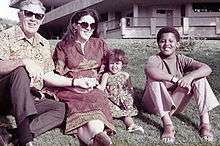
From ages six to ten, Obama attended local Indonesian-language schools: Santo Fransiskus Asisi (St. Francis of Assisi) Catholic School for two years and Besuki Public School for one and a half years, supplemented by English-language Calvert School homeschooling by his mother.[18][19]
Obama returned to Honolulu in 1971 to live with his maternal grandparents, Madelyn and Stanley Dunham, and with the aid of a scholarship attended Punahou School, a private college preparatory school, from fifth grade until his graduation from high school in 1979.[20] In his youth, Obama went by the nickname Barry.[21] Obama lived with his mother and sister in Hawaii for three years from 1972 to 1975 while his mother was a graduate student in anthropology at the University of Hawaii.[22] Obama chose to stay in Hawaii with his grandparents for high school at Punahou when his mother and sister returned to Indonesia in 1975 so his mother could begin anthropology field work.[23] His mother spent most of the next two decades in Indonesia, divorcing Lolo in 1980 and earning a PhD degree in 1992, before dying in 1995 in Hawaii following treatment for ovarian cancer and uterine cancer.[24]
Of his early childhood, Obama recalled, "That my father looked nothing like the people around me – that he was black as pitch, my mother white as milk – barely registered in my mind."[10] He described his struggles as a young adult to reconcile social perceptions of his multiracial heritage.[25] Reflecting later on his years in Honolulu, Obama wrote: "The opportunity that Hawaii offered – to experience a variety of cultures in a climate of mutual respect – became an integral part of my world view, and a basis for the values that I hold most dear."[26] Obama has also written and talked about using alcohol, marijuana, and cocaine during his teenage years to "push questions of who I was out of my mind".[27] Obama was also a member of the "choom gang", a self-named group of friends that spent time together and occasionally smoked marijuana.[28][29]
After high school, Obama moved to Los Angeles in 1979 to attend Occidental College. In February 1981, Obama made his first public speech, calling for Occidental to participate in the disinvestment from South Africa in response to that nation's policy of apartheid.[30] In mid-1981, Obama traveled to Indonesia to visit his mother and half-sister Maya, and visited the families of college friends in Pakistan and India for three weeks.[30] Later in 1981, he transferred as a junior to Columbia College, Columbia University, in New York City, where he majored in political science with a specialty in international relations[31] and in English literature[32] and lived off-campus on West 109th Street.[33] He graduated with a BA degree in 1983 and worked for a year at the Business International Corporation,[34] then at the New York Public Interest Research Group.[35][36] In 1985, Obama was among the leaders of May Day efforts to bring attention to the New York City Subway system, which was in a bad condition at the time. Obama traveled to several subway stations to get people to sign letters addressed to local officials and the Metropolitan Transportation Authority, and was photographed at the City College subway station holding a sign protesting against the system's condition.[37]
Family and personal life
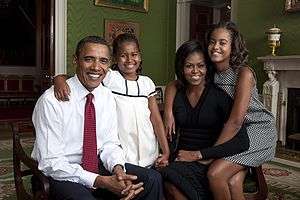
In a 2006 interview, Obama highlighted the diversity of his extended family: "It's like a little mini-United Nations", he said. "I've got relatives who look like Bernie Mac, and I've got relatives who look like Margaret Thatcher."[38] Obama has a half-sister with whom he was raised (Maya Soetoro-Ng, the daughter of his mother and her Indonesian second husband) and seven half-siblings from his Kenyan father's family—six of them living.[39] Obama's mother was survived by her Kansas-born mother, Madelyn Dunham,[40] until her death on November 2, 2008,[41] two days before his election to the Presidency. Obama also has roots in Ireland; he met with his Irish cousins in Moneygall in May 2011.[42] In Dreams from My Father, Obama ties his mother's family history to possible Native American ancestors and distant relatives of Jefferson Davis, President of the Confederate States of America during the American Civil War.[43]
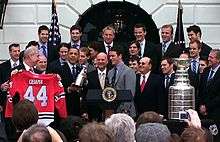
Besides his native English, Obama speaks some basic Indonesian, having learned the language during his four childhood years in Jakarta.[44][45] He plays basketball, a sport he participated in as a member of his high school's varsity team;[46] he is left-handed.[47]
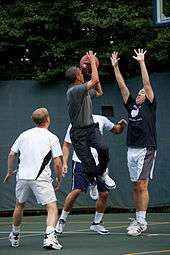
Obama is a supporter of the Chicago White Sox, and he threw out the first pitch at the 2005 ALCS when he was still a senator.[48] In 2009, he threw out the ceremonial first pitch at the All-Star Game while wearing a White Sox jacket.[49] He is also primarily a Chicago Bears football fan in the NFL, but in his childhood and adolescence was a fan of the Pittsburgh Steelers, and rooted for them ahead of their victory in Super Bowl XLIII 12 days after he took office as President.[50] In 2011, Obama invited the 1985 Chicago Bears to the White House; the team had not visited the White House after their Super Bowl win in 1986 due to the Space Shuttle Challenger disaster.[51]
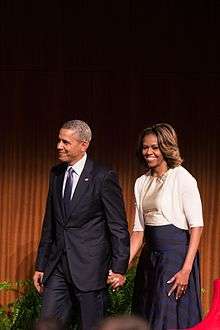
In June 1989, Obama met Michelle Robinson when he was employed as a summer associate at the Chicago law firm of Sidley Austin.[52] Assigned for three months as Obama's adviser at the firm, Robinson joined him at several group social functions, but declined his initial requests to date.[53] They began dating later that summer, became engaged in 1991, and were married on October 3, 1992.[54] The couple's first daughter, Malia Ann, was born on July 4, 1998,[55] followed by a second daughter, Natasha ("Sasha"), on June 10, 2001.[56] The Obama daughters attended the private University of Chicago Laboratory Schools. When they moved to Washington, D.C., in January 2009, the girls started at the private Sidwell Friends School.[57] The Obamas have two Portuguese Water Dogs, the first, a male named Bo, a gift from Senator Ted Kennedy.[58] In August 2013, Bo was joined by Sunny, a female.[59]
Applying the proceeds of a book deal, the family moved in 2005 from a Hyde Park, Chicago condominium to a $1.6 million house in neighboring Kenwood, Chicago.[60] The purchase of an adjacent lot—and sale of part of it to Obama by the wife of developer, campaign donor and friend Tony Rezko—attracted media attention because of Rezko's subsequent indictment and conviction on political corruption charges that were unrelated to Obama.[61]
In December 2007, Money estimated the Obama family's net worth at $1.3 million.[62] Their 2009 tax return showed a household income of $5.5 million—up from about $4.2 million in 2007 and $1.6 million in 2005—mostly from sales of his books.[63][64] On his 2010 income of $1.7 million, he gave 14% to non-profit organizations, including $131,000 to Fisher House Foundation, a charity assisting wounded veterans' families, allowing them to reside near where the veteran is receiving medical treatments.[65][66] As per his 2012 financial disclosure, Obama may be worth as much as $10 million.[67]
Regarding to Obama's smoking habit, in early 2010, Michelle Obama said that he had quit smoking.[68][69]
On his 55th birthday, August 4, 2016, Obama penned an essay in Glamour describing how his daughters and being president have made him a feminist.[70][71][72]
Religious views
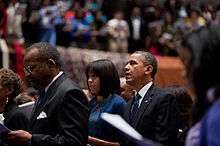
Obama is a Protestant Christian whose religious views developed in his adult life.[73] He wrote in The Audacity of Hope that he "was not raised in a religious household". He described his mother, raised by non-religious parents, as being detached from religion, yet "in many ways the most spiritually awakened person that I have ever known." He described his father as a "confirmed atheist" by the time his parents met, and his stepfather as "a man who saw religion as not particularly useful." Obama explained how, through working with black churches as a community organizer while in his twenties, he came to understand "the power of the African-American religious tradition to spur social change."[74]
In January 2008, Obama told Christianity Today: "I am a Christian, and I am a devout Christian. I believe in the redemptive death and resurrection of Jesus Christ. I believe that faith gives me a path to be cleansed of sin and have eternal life."[75] On September 27, 2010, Obama released a statement commenting on his religious views saying "I'm a Christian by choice. My family didn't – frankly, they weren't folks who went to church every week. And my mother was one of the most spiritual people I knew, but she didn't raise me in the church. So I came to my Christian faith later in life, and it was because the precepts of Jesus Christ spoke to me in terms of the kind of life that I would want to lead – being my brothers' and sisters' keeper, treating others as they would treat me."[76][77]
Obama met Trinity United Church of Christ pastor Rev. Jeremiah Wright in October 1987, and became a member of Trinity in 1992.[78] He resigned from Trinity in May 2008 during his first presidential campaign after some of Wright's statements were criticized.[79] The Obama family has attended several Protestant churches since moving to Washington, D.C., in 2009, including Shiloh Baptist Church and St. John's Episcopal Church. After a prolonged effort to find a church to attend regularly in Washington, Obama announced in June 2009 that his primary place of worship would be the Evergreen Chapel at Camp David.[80]
Law career
Community organizer and Harvard Law School
Two years after graduating, Obama was hired in Chicago as director of the Developing Communities Project, a church-based community organization originally comprising eight Catholic parishes in Roseland, West Pullman, and Riverdale on Chicago's South Side. He worked there as a community organizer from June 1985 to May 1988.[36][81] He helped set up a job training program, a college preparatory tutoring program, and a tenants' rights organization in Altgeld Gardens.[82] Obama also worked as a consultant and instructor for the Gamaliel Foundation, a community organizing institute.[83] In mid-1988, he traveled for the first time in Europe for three weeks and then for five weeks in Kenya, where he met many of his paternal relatives for the first time.[84][85]
|
|
Obama entered Harvard Law School in the fall of 1988, living in nearby Somerville, Massachusetts.[87] He was selected as an editor of the Harvard Law Review at the end of his first year,[88] president of the journal in his second year,[82][89] and research assistant to the constitutional scholar Laurence Tribe while at Harvard for two years.[90] During his summers, he returned to Chicago, where he worked as an associate at the law firms of Sidley Austin in 1989 and Hopkins & Sutter in 1990.[91] After graduating with a JD degree magna cum laude[92] from Harvard in 1991, he returned to Chicago.[88] Obama's election as the first black president of the Harvard Law Review gained national media attention[82][89] and led to a publishing contract and advance for a book about race relations,[93] which evolved into a personal memoir. The manuscript was published in mid-1995 as Dreams from My Father.[93]
Chicago Law School and civil rights attorney
In 1991, Obama accepted a two-year position as Visiting Law and Government Fellow at the University of Chicago Law School to work on his first book.[93][94] He then taught constitutional law at the University of Chicago Law School for twelve years, first as a Lecturer from 1992 to 1996, and then as a Senior Lecturer from 1996 to 2004.[95]
From April to October 1992, Obama directed Illinois's Project Vote, a voter registration campaign with ten staffers and seven hundred volunteer registrars; it achieved its goal of registering 150,000 of 400,000 unregistered African Americans in the state, leading Crain's Chicago Business to name Obama to its 1993 list of "40 under Forty" powers to be.[96]
He joined Davis, Miner, Barnhill & Galland, a 13-attorney law firm specializing in civil rights litigation and neighborhood economic development, where he was an associate for three years from 1993 to 1996, then of counsel from 1996 to 2004. In 1994, he was listed as one of the lawyers in Buycks-Roberson v. Citibank Fed. Sav. Bank, 94 C 4094 (N.D. Ill.).[97] This class action lawsuit was filed in 1994 with Selma Buycks-Roberson as lead plaintiff and alleged that Citibank Federal Savings Bank had engaged in practices forbidden under the Equal Credit Opportunity Act and the Fair Housing Act.[98] The case was settled out of court.[99] Final Judgment was issued on May 13, 1998, with Citibank Federal Savings Bank agreeing to pay attorney fees.[100] His law license became inactive in 2007.[101][102]
From 1994 to 2002, Obama served on the boards of directors of the Woods Fund of Chicago, which in 1985 had been the first foundation to fund the Developing Communities Project, and of the Joyce Foundation.[36] He served on the board of directors of the Chicago Annenberg Challenge from 1995 to 2002, as founding president and chairman of the board of directors from 1995 to 1999.[36]
Legislative career
Illinois State Senator (1997–2004)
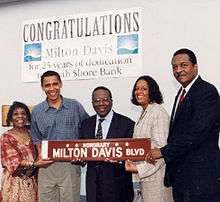
Obama was elected to the Illinois Senate in 1996, succeeding Democratic State Senator Alice Palmer from Illinois's 13th District, which, at that time, spanned Chicago South Side neighborhoods from Hyde Park–Kenwood south to South Shore and west to Chicago Lawn.[103] Once elected, Obama gained bipartisan support for legislation that reformed ethics and health care laws.[104] He sponsored a law that increased tax credits for low-income workers, negotiated welfare reform, and promoted increased subsidies for childcare.[105] In 2001, as co-chairman of the bipartisan Joint Committee on Administrative Rules, Obama supported Republican Governor Ryan's payday loan regulations and predatory mortgage lending regulations aimed at averting home foreclosures.[106]
He was reelected to the Illinois Senate in 1998, defeating Republican Yesse Yehudah in the general election, and was reelected again in 2002.[107] In 2000, he lost a Democratic primary race for Illinois's 1st congressional district in the United States House of Representatives to four-term incumbent Bobby Rush by a margin of two to one.[108]
In January 2003, Obama became chairman of the Illinois Senate's Health and Human Services Committee when Democrats, after a decade in the minority, regained a majority.[109] He sponsored and led unanimous, bipartisan passage of legislation to monitor racial profiling by requiring police to record the race of drivers they detained, and legislation making Illinois the first state to mandate videotaping of homicide interrogations.[105][110] During his 2004 general election campaign for U.S. Senate, police representatives credited Obama for his active engagement with police organizations in enacting death penalty reforms.[111] Obama resigned from the Illinois Senate in November 2004 following his election to the U.S. Senate.[112]
2004 U.S. Senate campaign
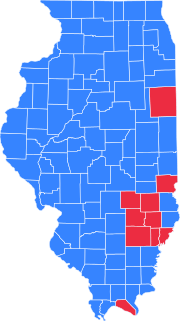
In May 2002, Obama commissioned a poll to assess his prospects in a 2004 U.S. Senate race. He created a campaign committee, began raising funds, and lined up political media consultant David Axelrod by August 2002. Obama formally announced his candidacy in January 2003.[113]
Obama was an early opponent of the George W. Bush administration's 2003 invasion of Iraq.[114] On October 2, 2002, the day President Bush and Congress agreed on the joint resolution authorizing the Iraq War,[115] Obama addressed the first high-profile Chicago anti-Iraq War rally,[116] and spoke out against the war.[117] He addressed another anti-war rally in March 2003 and told the crowd that "it's not too late" to stop the war.[118]
Decisions by Republican incumbent Peter Fitzgerald and his Democratic predecessor Carol Moseley Braun to not participate in the election resulted in wide-open Democratic and Republican primary contests involving fifteen candidates.[119] In the March 2004 primary election, Obama won in an unexpected landslide—which overnight made him a rising star within the national Democratic Party, started speculation about a presidential future, and led to the reissue of his memoir, Dreams from My Father.[120] In July 2004, Obama delivered the keynote address at the 2004 Democratic National Convention,[121] seen by 9.1 million viewers. His speech was well received and elevated his status within the Democratic Party.[122]
Obama's expected opponent in the general election, Republican primary winner Jack Ryan, withdrew from the race in June 2004.[123] Six weeks later, Alan Keyes accepted the Republican nomination to replace Ryan.[124] In the November 2004 general election, Obama won with 70% of the vote.[125]
U.S. Senator from Illinois (2005–2008)
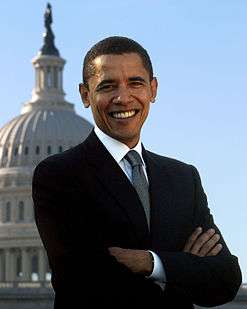
Obama was sworn in as a senator on January 3, 2005,[126] becoming the only Senate member of the Congressional Black Caucus.[127] CQ Weekly characterized him as a "loyal Democrat" based on analysis of all Senate votes from 2005 to 2007. Obama announced on November 13, 2008, that he would resign his Senate seat on November 16, 2008, before the start of the lame-duck session, to focus on his transition period for the presidency.[128]
Legislation
Obama cosponsored the Secure America and Orderly Immigration Act.[129] He introduced two initiatives that bore his name: Lugar–Obama, which expanded the Nunn–Lugar Cooperative Threat Reduction concept to conventional weapons;[130] and the Federal Funding Accountability and Transparency Act of 2006, which authorized the establishment of USAspending.gov, a web search engine on federal spending.[131] On June 3, 2008, Senator Obama—along with Senators Tom Carper, Tom Coburn, and John McCain—introduced follow-up legislation: Strengthening Transparency and Accountability in Federal Spending Act of 2008.[132]
Obama sponsored legislation that would have required nuclear plant owners to notify state and local authorities of radioactive leaks, but the bill failed to pass in the full Senate after being heavily modified in committee.[133] Regarding tort reform, Obama voted for the Class Action Fairness Act of 2005 and the FISA Amendments Act of 2008, which grants immunity from civil liability to telecommunications companies complicit with NSA warrantless wiretapping operations.[134]
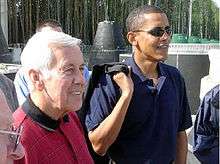
In December 2006, President Bush signed into law the Democratic Republic of the Congo Relief, Security, and Democracy Promotion Act, marking the first federal legislation to be enacted with Obama as its primary sponsor.[136] In January 2007, Obama and Senator Feingold introduced a corporate jet provision to the Honest Leadership and Open Government Act, which was signed into law in September 2007.[137] Obama also introduced two unsuccessful bills: the Deceptive Practices and Voter Intimidation Prevention Act to criminalize deceptive practices in federal elections,[138] and the Iraq War De-Escalation Act of 2007.[139]
Later in 2007, Obama sponsored an amendment to the Defense Authorization Act to add safeguards for personality-disorder military discharges.[140] This amendment passed the full Senate in the spring of 2008.[141] He sponsored the Iran Sanctions Enabling Act supporting divestment of state pension funds from Iran's oil and gas industry, which has not passed committee; and co-sponsored legislation to reduce risks of nuclear terrorism.[142] Obama also sponsored a Senate amendment to the State Children's Health Insurance Program, providing one year of job protection for family members caring for soldiers with combat-related injuries.[143]
Committees
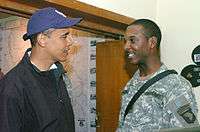
Obama held assignments on the Senate Committees for Foreign Relations, Environment and Public Works and Veterans' Affairs through December 2006.[144] In January 2007, he left the Environment and Public Works committee and took additional assignments with Health, Education, Labor and Pensions and Homeland Security and Governmental Affairs.[145] He also became Chairman of the Senate's subcommittee on European Affairs.[146] As a member of the Senate Foreign Relations Committee, Obama made official trips to Eastern Europe, the Middle East, Central Asia and Africa. He met with Mahmoud Abbas before Abbas became President of the Palestinian National Authority, and gave a speech at the University of Nairobi in which he condemned corruption within the Kenyan government.[147]
44th President of the United States
Presidential campaigns
2008 presidential campaign
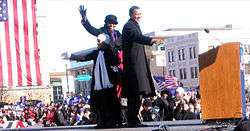
On February 10, 2007, Obama announced his candidacy for President of the United States in front of the Old State Capitol building in Springfield, Illinois.[148][149] The choice of the announcement site was viewed as symbolic because it was also where Abraham Lincoln delivered his historic "House Divided" speech in 1858.[148][150] Obama emphasized issues of rapidly ending the Iraq War, increasing energy independence, and reforming the health care system,[151] in a campaign that projected themes of hope and change.[152]
Numerous candidates entered the Democratic Party presidential primaries. The field narrowed to a duel between Obama and Senator Hillary Clinton after early contests, with the race remaining close throughout the primary process but with Obama gaining a steady lead in pledged delegates due to better long-range planning, superior fundraising, dominant organizing in caucus states, and better exploitation of delegate allocation rules.[153] On June 7, 2008, Clinton ended her campaign and endorsed Obama.[154]
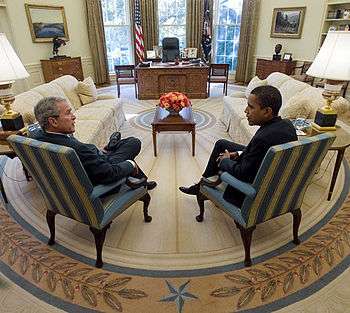
On August 23, Obama announced his selection of Delaware Senator Joe Biden as his vice presidential running mate.[155] Obama selected Biden from a field speculated to include former Indiana Governor and Senator Evan Bayh and Virginia Governor Tim Kaine.[156] At the Democratic National Convention in Denver, Colorado, Hillary Clinton called for her supporters to endorse Obama, and she and Bill Clinton gave convention speeches in his support.[157] Obama delivered his acceptance speech, not at the center where the Democratic National Convention was held, but at Invesco Field at Mile High to a crowd of over 75,000; the speech was viewed by over 38 million people worldwide.[158][159]
During both the primary process and the general election, Obama's campaign set numerous fundraising records, particularly in the quantity of small donations.[160] On June 19, 2008, Obama became the first major-party presidential candidate to turn down public financing in the general election since the system was created in 1976.[161]
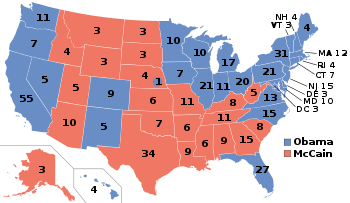
John McCain was nominated as the Republican candidate, and the two engaged in three presidential debates in September and October 2008.[162] On November 4, Obama won the presidency with 365 electoral votes to 173 received by McCain.[163] Obama won 52.9% of the popular vote to McCain's 45.7%.[164] He became the first African American to be elected president.[165] Obama delivered his victory speech before hundreds of thousands of supporters in Chicago's Grant Park.[166]
2012 presidential campaign
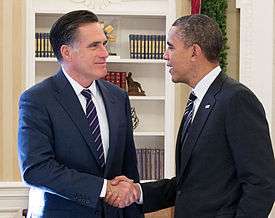
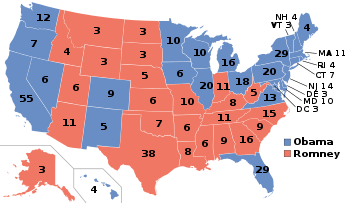
On April 4, 2011, Obama announced his reelection campaign for 2012 in a video titled "It Begins with Us" that he posted on his website and filed election papers with the Federal Election Commission.[167][168][169] As the incumbent president he ran virtually unopposed in the Democratic Party presidential primaries,[170] and on April 3, 2012, Obama had secured the 2778 convention delegates needed to win the Democratic nomination.[171]
At the Democratic National Convention in Charlotte, North Carolina, Obama and Joe Biden were formally nominated by former President Bill Clinton, as the Democratic Party candidates for president and vice president in the general election. Their main opponents were Republicans Mitt Romney, the former governor of Massachusetts, and Representative Paul Ryan of Wisconsin.[172]
On November 6, 2012, Obama won 332 electoral votes, exceeding the 270 required for him to be reelected as president.[173][174][175] With 51.1% of the popular vote,[176] Obama became the first Democratic president since Franklin D. Roosevelt to twice win the majority of the popular vote.[177][178] President Obama addressed supporters and volunteers at Chicago's McCormick Place after his reelection and said: "Tonight you voted for action, not politics as usual. You elected us to focus on your jobs, not ours. And in the coming weeks and months, I am looking forward to reaching out and working with leaders of both parties."[179][180]
Presidency (2009–2017)
First 100 days
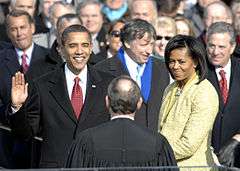
The inauguration of Barack Obama as the 44th President took place on January 20, 2009. In his first few days in office, Obama issued executive orders and presidential memoranda directing the U.S. military to develop plans to withdraw troops from Iraq.[181] He ordered the closing of the Guantanamo Bay detention camp,[182] but Congress prevented the closure by refusing to appropriate the required funds[183][184][185] and preventing moving any Guantanamo detainee into the U.S. or to other countries.[186] Obama reduced the secrecy given to presidential records.[187] He also revoked President George W. Bush's restoration of President Ronald Reagan's Mexico City Policy prohibiting federal aid to international family planning organizations that perform or provide counseling about abortion.[188]
Domestic policy
The first bill signed into law by Obama was the Lilly Ledbetter Fair Pay Act of 2009, relaxing the statute of limitations for equal-pay lawsuits.[189] Five days later, he signed the reauthorization of the State Children's Health Insurance Program (SCHIP) to cover an additional 4 million uninsured children.[190] In March 2009, Obama reversed a Bush-era policy that had limited funding of embryonic stem cell research and pledged to develop "strict guidelines" on the research.[191]
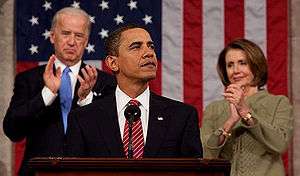
Obama appointed two women to serve on the Supreme Court in the first two years of his Presidency. Sonia Sotomayor, nominated by Obama on May 26, 2009, to replace retiring Associate Justice David Souter, was confirmed on August 6, 2009,[192] becoming the first Hispanic Supreme Court Justice.[193] Elena Kagan, nominated by Obama on May 10, 2010, to replace retiring Associate Justice John Paul Stevens, was confirmed on August 5, 2010, bringing the number of women sitting simultaneously on the Court to three, for the first time in American history.[194]
On March 30, 2010, Obama signed the Health Care and Education Reconciliation Act, a reconciliation bill that ends the process of the federal government giving subsidies to private banks to give out federally insured loans, increases the Pell Grant scholarship award, and makes changes to the Patient Protection and Affordable Care Act.[195][196]
In a major space policy speech in April 2010, Obama announced a planned change in direction at NASA, the U.S. space agency. He ended plans for a return of human spaceflight to the moon and development of the Ares I rocket, Ares V rocket and Constellation program, in favor of funding Earth science projects, a new rocket type, and research and development for an eventual manned mission to Mars, and ongoing missions to the International Space Station.[197]
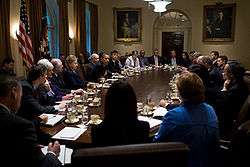
President Obama's 2011 State of the Union Address focused on themes of education and innovation, stressing the importance of innovation economics to make the United States more competitive globally. He spoke of a five-year freeze in domestic spending, eliminating tax breaks for oil companies and reversing tax cuts for the wealthiest Americans, banning congressional earmarks, and reducing healthcare costs. He promised that the United States would have one million electric vehicles on the road by 2015 and would be 80% reliant on "clean" electricity.[198][199]
LGBT rights
On October 8, 2009, Obama signed the Matthew Shepard and James Byrd Jr. Hate Crimes Prevention Act, a measure that expands the 1969 United States federal hate-crime law to include crimes motivated by a victim's actual or perceived gender, sexual orientation, gender identity, or disability.[200][201]
On December 22, 2010, Obama signed the Don't Ask, Don't Tell Repeal Act of 2010, fulfilling a key promise made in the 2008 presidential campaign[202][203] to end the Don't ask, don't tell policy of 1993 that had prevented gay and lesbian people from serving openly in the United States Armed Forces.[204]
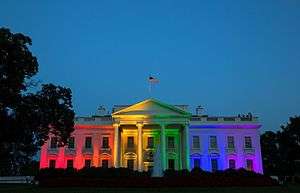
In 1996, as a candidate for the Illinois state senate, Obama had said that he favored legalizing same-sex marriage;[205] but by the time of his Senate run in 2004, he said that while he supported civil unions and domestic partnerships for same-sex partners, for strategic reasons he opposed same-sex marriages.[206] On May 9, 2012, shortly after the official launch of his campaign for reelection as president, Obama said his views had evolved, and he publicly affirmed his personal support for the legalization of same-sex marriage, becoming the first sitting U.S. president to do so.[207][208]
During his second inaugural address on January 21, 2013,[180] Obama became the first president to call for full equality for gay Americans: "Our journey is not complete until our gay brothers and sisters are treated like anyone else under the law – for if we are truly created equal, then surely the love we commit to one another must be equal as well." This was the first time that a president mentioned gay rights or the word "gay" in an inaugural address.[209][210] In 2013, the Obama administration filed briefs urging the Supreme Court to rule in favor of same-sex couples in the cases of Hollingsworth v. Perry (regarding same-sex marriage)[211] and United States v. Windsor (regarding the Defense of Marriage Act).[212] Then, following the Supreme Court's 2015 decision in Obergefell v. Hodges (ruling same-sex marriage to be a fundamental right), Obama asserted that, "This decision affirms what millions of Americans already believe in their hearts: When all Americans are treated as equal we are all more free."[213]
White House advisory and oversight groups
On March 11, 2009, Obama created the White House Council on Women and Girls, which forms part of the Office of Intergovernmental Affairs, having been established by Executive Order 13506 with a broad mandate to advise him on issues relating to the welfare of American women and girls.[214] The Council is currently chaired by Senior Advisor to the President Valerie Jarrett.[215] Obama also established the White House Task Force to Protect Students from Sexual Assault through an official United States government memorandum on January 22, 2014, with a broad mandate to advise him on issues relating to sexual assault on college and university campuses throughout the United States.[215][216][217] The current co-chairs of the Task Force are Vice President Joe Biden and Jarrett.[216] The Task Force has been a development out of the White House Council on Women and Girls and Office of the Vice President of the United States, and prior to that, the 1994 Violence Against Women Act that was first-drafted by Biden.[218]
Economic policy
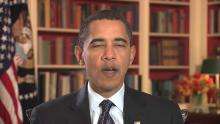
On February 17, 2009, Obama signed the American Recovery and Reinvestment Act of 2009, a $787 billion economic stimulus package aimed at helping the economy recover from the deepening worldwide recession.[219] The act includes increased federal spending for health care, infrastructure, education, various tax breaks and incentives, and direct assistance to individuals.[220]
In March, Obama's Treasury Secretary, Timothy Geithner, took further steps to manage the financial crisis, including introducing the Public-Private Investment Program for Legacy Assets, which contains provisions for buying up to two trillion dollars in depreciated real estate assets.[221] Obama intervened in the troubled automotive industry[222] in March 2009, renewing loans for General Motors and Chrysler to continue operations while reorganizing. Over the following months the White House set terms for both firms' bankruptcies, including the sale of Chrysler to Italian automaker Fiat[223] and a reorganization of GM giving the U.S. government a temporary 60% equity stake in the company, with the Canadian government taking a 12% stake.[224] In June 2009, dissatisfied with the pace of economic stimulus, Obama called on his cabinet to accelerate the investment.[225] He signed into law the Car Allowance Rebate System, known colloquially as "Cash for Clunkers", that temporarily boosted the economy.[226][227][228]
Spending and loan guarantees from the Federal Reserve and the Treasury Department authorized by the Bush and Obama administrations totaled about $11.5 trillion, but only $3 trillion was spent by the end of November 2009.[229] Obama and the Congressional Budget Office predicted the 2010 budget deficit would be $1.5 trillion or 10.6% of the nation's gross domestic product (GDP) compared to the 2009 deficit of $1.4 trillion or 9.9% of GDP.[230][231] For 2011, the administration predicted the deficit will shrink to $1.34 trillion, and the 10-year deficit will increase to $8.53 trillion or 90% of GDP.[232] The most recent increase in the U.S. debt ceiling to $17.2 trillion took effect in February 2014.[233] On August 2, 2011, after a lengthy congressional debate over whether to raise the nation's debt limit, Obama signed the bipartisan Budget Control Act of 2011. The legislation enforces limits on discretionary spending until 2021, establishes a procedure to increase the debt limit, creates a Congressional Joint Select Committee on Deficit Reduction to propose further deficit reduction with a stated goal of achieving at least $1.5 trillion in budgetary savings over 10 years, and establishes automatic procedures for reducing spending by as much as $1.2 trillion if legislation originating with the new joint select committee does not achieve such savings.[234] By passing the legislation, Congress was able to prevent a U.S. government default on its obligations.[235]
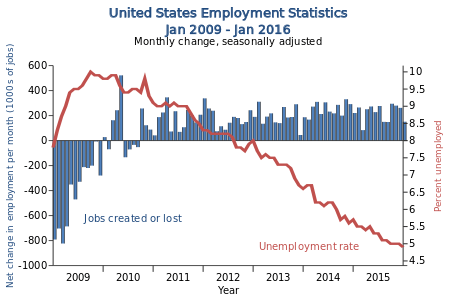
As it did throughout 2008, the unemployment rate rose in 2009, reaching a peak in October at 10.0% and averaging 10.0% in the fourth quarter. Following a decrease to 9.7% in the first quarter of 2010, the unemployment rate fell to 9.6% in the second quarter, where it remained for the rest of the year.[238] Between February and December 2010, employment rose by 0.8%, which was less than the average of 1.9% experienced during comparable periods in the past four employment recoveries.[239] By November 2012, the unemployment rate fell to 7.7%,[240] decreasing to 6.7% in the last month of 2013.[241] During 2014, the unemployment rate continued to decline, falling to 6.3% in the first quarter.[242] GDP growth returned in the third quarter of 2009, expanding at a rate of 1.6%, followed by a 5.0% increase in the fourth quarter.[243] Growth continued in 2010, posting an increase of 3.7% in the first quarter, with lesser gains throughout the rest of the year.[243] In July 2010, the Federal Reserve noted that economic activity continued to increase, but its pace had slowed, and chairman Ben Bernanke said the economic outlook was "unusually uncertain".[244] Overall, the economy expanded at a rate of 2.9% in 2010.[245]
The Congressional Budget Office and a broad range of economists credit Obama's stimulus plan for economic growth.[246][247] The CBO released a report stating that the stimulus bill increased employment by 1–2.1 million,[247][248][249][250] while conceding that "It is impossible to determine how many of the reported jobs would have existed in the absence of the stimulus package."[246] Although an April 2010 survey of members of the National Association for Business Economics showed an increase in job creation (over a similar January survey) for the first time in two years, 73% of 68 respondents believed that the stimulus bill has had no impact on employment.[251] The economy of the United States has grown faster than the other original NATO members by a wider margin under President Obama than it has anytime since the end of World War II.[252] The OECD credits the much faster growth in the United States to the stimulus in the United States and the austerity measures in the European Union.[253]
Within a month of the 2010 midterm elections, Obama announced a compromise deal with the Congressional Republican leadership that included a temporary, two-year extension of the 2001 and 2003 income tax rates, a one-year payroll tax reduction, continuation of unemployment benefits, and a new rate and exemption amount for estate taxes.[254] The compromise overcame opposition from some in both parties, and the resulting $858 billion Tax Relief, Unemployment Insurance Reauthorization, and Job Creation Act of 2010 passed with bipartisan majorities in both houses of Congress before Obama signed it on December 17, 2010.[255]
In December 2013, Obama declared that growing income inequality is a "defining challenge of our time" and called on Congress to bolster the safety net and raise wages. This came on the heels of the nationwide strikes of fast-food workers and Pope Francis' criticism of inequality and trickle-down economics.[256]
Obama has urged Congress to ratify a 12-nation free trade pact called the Trans-Pacific Partnership.[257]
Environmental policy
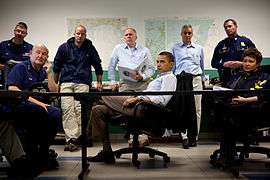
On September 30, 2009, the Obama administration proposed new regulations on power plants, factories, and oil refineries in an attempt to limit greenhouse gas emissions and to curb global warming.[258][259]
On April 20, 2010, an explosion destroyed an offshore drilling rig at the Macondo Prospect in the Gulf of Mexico, causing a major sustained oil leak. Obama visited the Gulf, announced a federal investigation, and formed a bipartisan commission to recommend new safety standards, after a review by Secretary of the Interior Ken Salazar and concurrent Congressional hearings. He then announced a six-month moratorium on new deepwater drilling permits and leases, pending regulatory review.[260] As multiple efforts by BP failed, some in the media and public expressed confusion and criticism over various aspects of the incident, and stated a desire for more involvement by Obama and the federal government.[261]
In July 2013, Obama expressed reservations and stated he "would reject the Keystone XL pipeline if it increased carbon pollution" or "greenhouse emissions".[262][263] Obama's advisers called for a halt to petroleum exploration in the Arctic in January 2013.[264] On February 24, 2015, Obama vetoed a bill that would authorize the pipeline.[265] It was the third veto of Obama's presidency and his first major veto.[266]
Health care reform

Obama called for Congress to pass legislation reforming health care in the United States, a key campaign promise and a top legislative goal.[267] He proposed an expansion of health insurance coverage to cover the uninsured, to cap premium increases, and to allow people to retain their coverage when they leave or change jobs. His proposal was to spend $900 billion over 10 years and include a government insurance plan, also known as the public option, to compete with the corporate insurance sector as a main component to lowering costs and improving quality of health care. It would also make it illegal for insurers to drop sick people or deny them coverage for pre-existing conditions, and require every American to carry health coverage. The plan also includes medical spending cuts and taxes on insurance companies that offer expensive plans.[268][269]
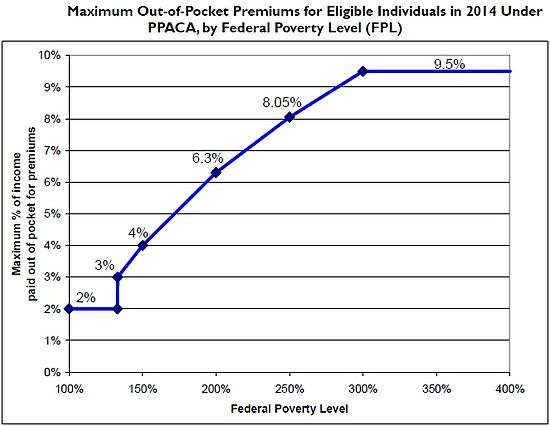
On July 14, 2009, House Democratic leaders introduced a 1,017-page plan for overhauling the U.S. health care system, which Obama wanted Congress to approve by the end of 2009.[267] After much public debate during the Congressional summer recess of 2009, Obama delivered a speech to a joint session of Congress on September 9 where he addressed concerns over the proposals.[271] In March 2009, Obama lifted a ban on using federal funds for stem cell research.[272]
On November 7, 2009, a health care bill featuring the public option was passed in the House.[273][274] On December 24, 2009, the Senate passed its own bill—without a public option—on a party-line vote of 60–39.[275] On March 21, 2010, the Patient Protection and Affordable Care Act (ACA) passed by the Senate in December was passed in the House by a vote of 219 to 212.[276] Obama signed the bill into law on March 23, 2010.[277]
The ACA includes health-related provisions, most of which took effect in 2014, including expanding Medicaid eligibility for people making up to 133% of the federal poverty level (FPL) starting in 2014,[278] subsidizing insurance premiums for people making up to 400% of the FPL ($88,000 for family of four in 2010) so their maximum "out-of-pocket" payment for annual premiums will be from 2% to 9.5% of income,[279][280] providing incentives for businesses to provide health care benefits, prohibiting denial of coverage and denial of claims based on pre-existing conditions, establishing health insurance exchanges, prohibiting annual coverage caps, and support for medical research. According to White House and Congressional Budget Office figures, the maximum share of income that enrollees would have to pay would vary depending on their income relative to the federal poverty level.[279][281]
The costs of these provisions are offset by taxes, fees, and cost-saving measures, such as new Medicare taxes for those in high-income brackets, taxes on indoor tanning, cuts to the Medicare Advantage program in favor of traditional Medicare, and fees on medical devices and pharmaceutical companies;[283] there is also a tax penalty for those who do not obtain health insurance, unless they are exempt due to low income or other reasons.[284] In March 2010, the Congressional Budget Office estimated that the net effect of both laws will be a reduction in the federal deficit by $143 billion over the first decade.[285]
The law faced several legal challenges, primarily based on the argument that an individual mandate requiring Americans to buy health insurance was unconstitutional. On June 28, 2012, the Supreme Court ruled by a 5–4 vote in National Federation of Independent Business v. Sebelius that the mandate was constitutional under the U.S. Congress's taxing authority.[286] In Burwell v. Hobby Lobby the Court ruled that "closely-held" for-profit corporations could be exempt on religious grounds under the Religious Freedom Restoration Act from regulations adopted under the ACA that would have required them to pay for insurance that covered certain contraceptives. In June 2015, the Court ruled 6–3 in King v. Burwell that subsidies to help individuals and families purchase health insurance were authorized for those doing so on both the federal exchange and state exchanges, not only those purchasing plans "established by the State," as the statute reads.[287]
Energy policy
Prior to June 2014, Obama offered substantial support for a broadly-based "All of the above" approach to domestic energy policy, which Obama has maintained since his first term and which he last confirmed at his State of the Union speech in January 2014 to a mixed reception by both parties. In June 2014, Obama made indications that his administration would consider a shift towards an energy policy more closely tuned to the manufacturing industry and its impact on the domestic economy.[288] Obama's approach of selectively combining regulation and incentive to various issues in the domestic energy policy such as coal mining and oil fracking has received mixed commentary for not being as responsive to the needs of the domestic manufacturing sector as needed, following claims that the domestic manufacturing sector utilizes as much as a third of nation's available energy resources.[289][290]
Gun control
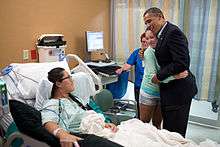
On January 16, 2013, one month after the Sandy Hook Elementary School shooting, President Obama signed 23 executive orders and outlined a series of sweeping proposals regarding gun control.[291] He urged Congress to reintroduce an expired ban on military-style assault weapons, such as those used in several recent mass shootings, impose limits on ammunition magazines to 10 rounds, introduce background checks on all gun sales, pass a ban on possession and sale of armor-piercing bullets, introduce harsher penalties for gun-traffickers, especially unlicensed dealers who buy arms for criminals and approving the appointment of the head of the federal Bureau of Alcohol, Tobacco, Firearms and Explosives for the first time since 2006.[292] On January 5, 2016, Obama announced new executive actions extending background check requirements to more gun sellers.[293] In a 2016 editorial in the New York Times, Obama compared the struggle for what he termed "common-sense gun reform" to women's suffrage and other civil rights movements in American history.[294]
2010 midterm elections
Obama called the November 2, 2010 election, where the Democratic Party lost 63 seats in, and control of, the House of Representatives,[295] "humbling" and a "shellacking".[296] He said that the results came because not enough Americans had felt the effects of the economic recovery.[297]
Cybersecurity and Internet policy
On November 10, 2014, President Obama recommended the Federal Communications Commission reclassify broadband Internet service as a telecommunications service in order to preserve net neutrality.[298][299] On February 12, 2013, President Obama signed Executive Order 13636, "Improving Critical Infrastructure Cybersecurity".[300]
Foreign policy
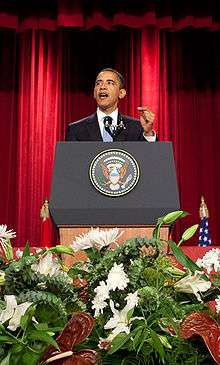
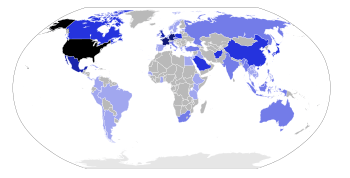
In February and March 2009, Vice President Joe Biden and Secretary of State Hillary Rodham Clinton made separate overseas trips to announce a "new era" in U.S. foreign relations with Russia and Europe, using the terms "break" and "reset" to signal major changes from the policies of the preceding administration.[301] Obama attempted to reach out to Arab leaders by granting his first interview to an Arab cable TV network, Al Arabiya.[302]
On March 19, Obama continued his outreach to the Muslim world, releasing a New Year's video message to the people and government of Iran.[303][304] In April, Obama gave a speech in Ankara, Turkey, which was well received by many Arab governments.[305] On June 4, 2009, Obama delivered a speech at Cairo University in Egypt calling for "A New Beginning" in relations between the Islamic world and the United States and promoting Middle East peace.[306]
On June 26, 2009, in response to the Iranian government's actions towards protesters following Iran's 2009 presidential election, Obama said: "The violence perpetrated against them is outrageous. We see it and we condemn it."[307] On July 7, while in Moscow, he responded to a Vice President Biden comment on a possible Israeli military strike on Iran by saying: "We have said directly to the Israelis that it is important to try and resolve this in an international setting in a way that does not create major conflict in the Middle East."[308]
On September 24, 2009, Obama became the first sitting U.S. president to preside over a meeting of the United Nations Security Council.[309]
In March 2010, Obama took a public stance against plans by the government of Israeli Prime Minister Benjamin Netanyahu to continue building Jewish housing projects in predominantly Arab neighborhoods of East Jerusalem.[310][311] During the same month, an agreement was reached with the administration of Russian President Dmitry Medvedev to replace the 1991 Strategic Arms Reduction Treaty with a new pact reducing the number of long-range nuclear weapons in the arsenals of both countries by about one-third.[312] Obama and Medvedev signed the New START treaty in April 2010, and the U.S. Senate ratified it in December 2010.[313]
In December 2011, Obama instructed agencies to consider LGBT rights when issuing financial aid to foreign countries.[314] He criticized Russia's law discriminating against gays in August 2013,[315] stopping short of advocating a boycott of the 2014 Winter Olympics held in Sochi, Russia.[316]
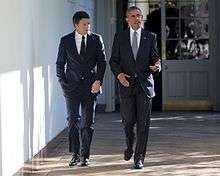
In December 2014, Obama announced that he intended to normalize relationships between Cuba and the United States.[317] The countries' respective "interests sections" in one another's capitals were upgraded to embassies on July 20, 2015.
In March 2015, Obama declared that he had authorized U.S. forces to provide logistical and intelligence support to the Saudis in their military intervention in Yemen, establishing a "Joint Planning Cell" with Saudi Arabia.[318]
War in Iraq
On February 27, 2009, Obama announced that combat operations in Iraq would end within 18 months. His remarks were made to a group of Marines preparing for deployment to Afghanistan. Obama said, "Let me say this as plainly as I can: by August 31, 2010, our combat mission in Iraq will end."[319] The Obama administration scheduled the withdrawal of combat troops to be completed by August 2010, decreasing troop's levels from 142,000 while leaving a transitional force of about 50,000 in Iraq until the end of 2011. On August 19, 2010, the last U.S. combat brigade exited Iraq. Remaining troops transitioned from combat operations to counter-terrorism and the training, equipping, and advising of Iraqi security forces.[320][321] On August 31, 2010, Obama announced that the United States combat mission in Iraq was over.[322] On October 21, 2011 President Obama announced that all U.S. troops would leave Iraq in time to be "home for the holidays".[323]
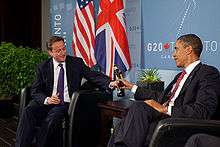
In June 2014, following the capture of Mosul by Daesh, Obama sent 275 troops to provide support and security for U.S. personnel and the U.S. Embassy in Baghdad. Daesh continued to gain ground and to commit widespread massacres and ethnic cleansing.[324][325]
In August 2014, during the Sinjar massacre, Obama ordered a campaign of U.S. airstrikes against Daesh.[326]
By the end of 2014, 3,100 American ground troops were committed to the conflict[327] and 16,000 sorties were flown over the battlefield, primarily by U.S. Air Force and Navy pilots.[328]
In the Spring of 2015, with the addition of the "Panther Brigade" of the 82nd Airborne Division the number of U.S. ground troops in Iraq surged to 4,400,[329] and by July American-led coalition air forces counted 44,000 sorties over the battlefield.[330]
War in Afghanistan
Early in his presidency, Obama moved to bolster U.S. troop strength in Afghanistan.[331] He announced an increase to U.S. troop levels of 17,000 in February 2009 to "stabilize a deteriorating situation in Afghanistan", an area he said had not received the "strategic attention, direction and resources it urgently requires".[332] He replaced the military commander in Afghanistan, General David D. McKiernan, with former Special Forces commander Lt. Gen. Stanley A. McChrystal in May 2009, indicating that McChrystal's Special Forces experience would facilitate the use of counterinsurgency tactics in the war.[333] On December 1, 2009, Obama announced the deployment of an additional 30,000 military personnel to Afghanistan and proposed to begin troop withdrawals 18 months from that date;[334] this took place in July 2011. David Petraeus replaced McChrystal in June 2010, after McChrystal's staff criticized White House personnel in a magazine article.[335] In February 2013, Obama said the U.S. military would reduce the troop level in Afghanistan from 68,000 to 34,000 U.S. troops by February 2014.[336]
In October 2015, in light of the deteriorating security situation, the White House announced a plan to keep U.S. Forces in Afghanistan indefinitely.[337]
Israel
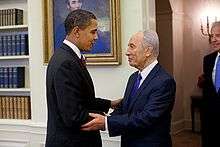
In 2011, the United States vetoed a Security Council resolution condemning Israeli settlements, with the United States being the only nation to do so.[338] Obama supports the two-state solution to the Arab–Israeli conflict based on the 1967 borders with land swaps.[339]
In June 2012, Obama said that the bond between the United States and Israel is "unbreakable."[340] During the initial years of the Obama administration, the U.S. increased military cooperation with Israel, including increased military aid, re-establishment of the U.S.-Israeli Joint Political Military Group and the Defense Policy Advisory Group, and an increase in visits among high-level military officials of both countries.[341] The Obama administration asked Congress to allocate money toward funding the Iron Dome program in response to the waves of Palestinian rocket attacks on Israel.[342]
In 2013, Jeffrey Goldberg reported that, in Obama's view, "with each new settlement announcement, Netanyahu is moving his country down a path toward near-total isolation."[343]
In 2014, President Obama likened the Zionist movement to the Civil Rights Movement in the United States. He said that both movements seek to bring justice and equal rights to historically persecuted peoples. He explained, "To me, being pro-Israel and pro-Jewish is part and parcel with the values that I've been fighting for since I was politically conscious and started getting involved in politics."[344] Obama expressed support for Israel's right to defend itself during the 2014 Israel–Gaza conflict.[345]
Libya
_04.jpg)
In February 2011, protests in Libya began against long-time dictator Muammar Gaddafi as part of the Arab Spring. They soon turned violent. In March, as forces loyal to Gaddafi advanced on rebels across Libya, calls for a no-fly zone came from around the world, including Europe, the Arab League, and a resolution[346] passed unanimously by the U.S. Senate.[347] In response to the unanimous passage of United Nations Security Council Resolution 1973 on March 17, Gaddafi—who had previously vowed to "show no mercy" to the rebels of Benghazi[348]—announced an immediate cessation of military activities,[349] yet reports came in that his forces continued shelling Misrata. The next day, on Obama's orders, the U.S. military took part in air strikes to destroy the Libyan government's air defense capabilities to protect civilians and enforce a no-fly-zone,[350] including the use of Tomahawk missiles, B-2 Spirits, and fighter jets.[351][352][353] Six days later, on March 25, by unanimous vote of all of its 28 members, NATO took over leadership of the effort, dubbed Operation Unified Protector.[354] Some Representatives[355] questioned whether Obama had the constitutional authority to order military action in addition to questioning its cost, structure and aftermath.[356][357]
Syrian Civil War
On August 18, 2011, several months after the start of the Syrian Civil War, Obama issued a written statement that said: "The time has come for President Assad to step aside."[358][359] This stance was reaffirmed in November 2015.[360] In 2012, Obama authorized multiple programs run by the CIA and the Pentagon to train anti-Assad rebels.[361] The Pentagon-run program was later found to have failed and was formally abandoned in October 2015.[362][363]
In the wake of a chemical weapons attack in Syria, formally blamed by the Obama administration on the Assad government, Obama chose not to enforce the "red line" he had pledged[364] and, rather than authorise the promised military action against Assad, went along with the Russia-brokered deal that led to Assad giving up chemical weapons; however attacks with chlorine gas continued.[365][366] In 2014, Obama authorized an air campaign aimed primarily at ISIL, but repeatedly promised that the U.S. would not deploy ground troops in Syria.[367][368]
Osama bin Laden
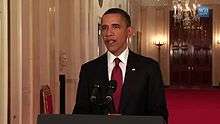
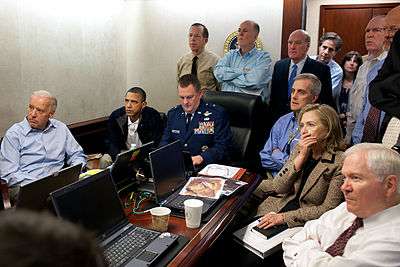
Starting with information received in July 2010, intelligence developed by the CIA over the next several months determined what they believed to be the location of Osama bin Laden in a large compound in Abbottabad, Pakistan, a suburban area 35 miles from Islamabad.[369] CIA head Leon Panetta reported this intelligence to President Obama in March 2011.[369] Meeting with his national security advisers over the course of the next six weeks, Obama rejected a plan to bomb the compound, and authorized a "surgical raid" to be conducted by United States Navy SEALs.[369] The operation took place on May 1, 2011, resulting in the death of bin Laden and the seizure of papers, computer drives and disks from the compound.[370][371] DNA testing identified bin Laden's body,[372] which was buried at sea several hours later.[373] Within minutes of the President's announcement from Washington, DC, late in the evening on May 1, there were spontaneous celebrations around the country as crowds gathered outside the White House, and at New York City's Ground Zero and Times Square.[370][374] Reaction to the announcement was positive across party lines, including from former presidents Bill Clinton and George W. Bush,[375] and from many countries around the world.[376]
Iran nuclear talks
.jpg)
In November 2013, Obama's administration opened negotiations with Iran to prevent it from acquiring nuclear weapons, which included an interim agreement. Negotiations took two years with numerous delays, with a deal being announced July 14, 2015. The deal, titled Joint Comprehensive Plan of Action, saw the removal of sanctions in exchange for measures that would prevent Iran from producing nuclear weapons. While Obama hailed the agreement as being a step towards a more hopeful world, the deal drew strong criticism from Republican and conservative quarters, and from Israeli prime minister Benjamin Netanyahu.[377][378][379]
Relations with Cuba
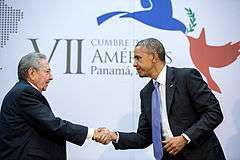
Since the spring of 2013, secret meetings were conducted between the United States and Cuba in the neutral locations of Canada and Vatican City.[380] The Vatican first became involved in 2013 when Pope Francis advised the U.S. and Cuba to exchange prisoners as a gesture of goodwill.[381] On December 10, 2013, Cuban President Raúl Castro, in a significant public moment, greeted and shook hands with Obama at the Nelson Mandela memorial service in Johannesburg.[382]
In December 2014, after the secret meetings, it was announced that Obama, with Pope Francis as an intermediary, had negotiated a restoration of relations with Cuba, after nearly sixty years of détente.[383] Popularly dubbed the Cuban Thaw, The New Republic deemed the Cuban Thaw to be "Obama's finest foreign policy achievement."[384] On July 1, 2015, President Barack Obama announced that formal diplomatic relations between Cuba and the United States would resume, and embassies would be opened in Washington and Havana.[385] The countries' respective "interests sections" in one another's capitals were upgraded to embassies on July 20 and August 13, 2015, respectively.[386]
Obama has visited Havana, Cuba, for two days in March 2016, becoming the first sitting U.S. President to arrive since Calvin Coolidge in 1928.[387]
Africa
Obama spoke in front of the African Union in Addis Ababa, Ethiopia, on July 29, 2015, the first sitting U.S. president to do so. He gave a speech encouraging the world to increase economic ties via investments and trade with the continent, and lauded the progresses made in education, infrastructure, and economy. He also criticized the lack of democracy and leaders who refuse to step aside, discrimination against minorities (LGBT people, religious groups and ethnicities), and corruption. He suggested an intensified democratization and free trade, to significantly improve the quality of life for Africans.[388][389] During his July 2015 trip, Obama also was the first U.S. president ever to visit Kenya, which is the homeland of his father.[390]
Hiroshima speech
On May 27, 2016, the 71st anniversary of the atomic bombing of Hiroshima by America, Obama became the first sitting American president to visit Hiroshima, Japan. Accompanied by Japanese Prime Minister Shinzo Abe, Obama paid tribute to the victims of the bombing at the Hiroshima Peace Memorial Museum.[391]
Russia
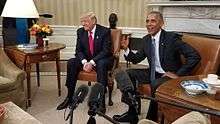
After Russia′s military intervention in Syria in 2015 and the alleged interference[392] in the 2016 election campaign in the U.S., Obama′s Russia policy was widely seen as a failure.[393] George Robertson, a former UK defense secretary and NATO secretary-general, said that Obama had “allowed Putin to jump back on the world stage and test the resolve of the West”, adding that the legacy of this disaster would last.[394]
Cultural and political image

Obama's family history, upbringing, and Ivy League education differ markedly from those of African-American politicians who launched their careers in the 1960s through participation in the civil rights movement.[395] Expressing puzzlement over questions about whether he is "black enough", Obama told an August 2007 meeting of the National Association of Black Journalists that "we're still locked in this notion that if you appeal to white folks then there must be something wrong."[396] Obama acknowledged his youthful image in an October 2007 campaign speech, saying: "I wouldn't be here if, time and again, the torch had not been passed to a new generation."[397]
Obama is frequently referred to as an exceptional orator.[398] During his pre-inauguration transition period and continuing into his presidency, Obama has delivered a series of weekly Internet video addresses.[399] Former presidential campaign surrogate and Georgetown professor, Michael Eric Dyson, is both critical and sympathetic of President Obama's leadership in race relations, indicating that Obama's speeches and action on racial disparity and justice have been somewhat reactive and reluctant when, especially in the later part of his second term, racial violence demanded immediate presidential action and conversation.[400]
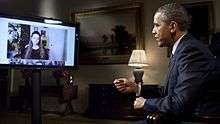
According to the Gallup Organization, Obama began his presidency with a 68% approval rating[402] before gradually declining for the rest of the year, and eventually bottoming out at 41% in August 2010,[403] a trend similar to Ronald Reagan's and Bill Clinton's first years in office.[404] He experienced a small poll bounce shortly after the death of Osama bin Laden on May 2, 2011. This bounce lasted until around June 2011, when his approval numbers dropped back to where they were previously.[405][406] His approval ratings rebounded around the same time as his reelection in 2012, with polls showing an average job approval of 52% shortly after his second inauguration.[407] Despite him dropping to 39% in his approval ratings in late-2013 due to the ACA roll-out, he has climbed to 50% in late January 2015 according to Gallup.[408] Polls show strong support for Obama in other countries,[409] and before being elected President he met with prominent foreign figures including former British Prime Minister Tony Blair,[410] Italy's Democratic Party leader and Mayor of Rome Walter Veltroni,[411] and French President Nicolas Sarkozy.[412]
In a February 2009 poll conducted in Western Europe and the U.S. by Harris Interactive for France 24 and the International Herald Tribune, Obama was rated as the most respected world leader, as well as the most powerful.[413] In a similar poll conducted by Harris in May 2009, Obama was rated as the most popular world leader, as well as the one figure most people would pin their hopes on for pulling the world out of the economic downturn.[414][415]
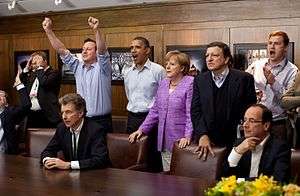
Obama won Best Spoken Word Album Grammy Awards for abridged audiobook versions of Dreams from My Father in February 2006 and for The Audacity of Hope in February 2008.[416] His concession speech after the New Hampshire primary was set to music by independent artists as the music video "Yes We Can", which was viewed 10 million times on YouTube in its first month[417] and received a Daytime Emmy Award.[418] In December 2008 and in 2012, Time magazine named Obama as its Person of the Year.[419] The 2008 awarding was for his historic candidacy and election, which Time described as "the steady march of seemingly impossible accomplishments".[420] On May 25, 2011, Obama became the first President of the United States to address both houses of the UK Parliament in Westminster Hall, London. This was only the fifth occurrence since the start of the 20th century, of a head of state being extended this invitation, following Charles de Gaulle in 1960, Nelson Mandela in 1996, Queen Elizabeth II in 2002 and Pope Benedict XVI in 2010.[421][422]
On October 9, 2009, the Norwegian Nobel Committee announced that Obama had won the 2009 Nobel Peace Prize "for his extraordinary efforts to strengthen international diplomacy and cooperation between peoples".[423] Obama accepted this award in Oslo, Norway on December 10, 2009, with "deep gratitude and great humility."[424] The award drew a mixture of praise and criticism from world leaders and media figures.[425][426][427][428][429][430][431] Obama's peace prize was called a "stunning surprise" by The New York Times.[432] Obama is the fourth U.S. president to be awarded the Nobel Peace Prize and the third to become a Nobel laureate while in office.[433] Obama's Nobel Prize has been viewed skeptically in subsequent years, especially after the director of the Nobel Institute, Geir Lundestad, said Obama's Peace Prize did not have the desired effect.[434]
Presidential library
The Barack Obama Presidential Center[435] is the planned presidential library of Barack Obama. The center will be hosted by the University of Chicago, and will be located in Jackson Park on the South Side of Chicago, Illinois. Once completed, it will become the 14th site in the National Archives and Records Administration's presidential library system.[436] The nonprofit Barack Obama Foundation was set up to oversee the creation of the Center and the building of its site.
See also
- Presidency of Barack Obama
- United States Senate career of Barack Obama
- Social policy of Barack Obama
- First 100 days of Barack Obama's presidency
- Timeline of the presidency of Barack Obama (2009)
- Timeline of the presidency of Barack Obama (2010)
- Timeline of the presidency of Barack Obama (2011)
- Timeline of the presidency of Barack Obama (2012)
- Timeline of the presidency of Barack Obama (2013)
- Timeline of the presidency of Barack Obama (2014)
- Timeline of the presidency of Barack Obama (2015)
- Timeline of the presidency of Barack Obama (2016)
Politics
- Political positions of Barack Obama
- DREAM Act
- Immigration Reform and Control Act of 1986
- List of international presidential trips made by Barack Obama
- Middle Class Tax Relief and Job Creation Act of 2012
- Fraud Enforcement and Recovery Act of 2009
- National Broadband Plan (United States)
- Office of Energy Efficiency and Renewable Energy
- Patient Protection and Affordable Care Act
- SPEECH Act
- Stay with It
- Tax Relief, Unemployment Insurance Reauthorization, and Job Creation Act of 2010
- American Recovery and Reinvestment Act of 2009
- White House Office of Energy and Climate Change Policy
Other
Lists
- List of people pardoned by Barack Obama
- Federal political scandals, 2009-2016
- List of Barack Obama presidential campaign endorsements, 2008
- List of Barack Obama presidential campaign endorsements, 2012
Notes and references
Notes
- ↑ "Barak". Merriam-Webster Dictionary., "Hussein". Merriam-Webster Dictionary., "Obama". Merriam-Webster Dictionary..
- ↑ "Barak". Dictionary.com Unabridged. Random House. "Hussein". Dictionary.com Unabridged. Random House. "Obama". Dictionary.com Unabridged. Random House.
- ↑ "President Barack Obama". Washington, D.C.: The White House. 2008. Retrieved December 12, 2008.
- ↑ "Certificate of Live Birth: Barack Hussein Obama II, August 4, 1961, 7:24 pm, Honolulu" (PDF). Department of Health, State of Hawaii. The White House. April 27, 2011. Archived from the original (PDF) on April 29, 2011. Retrieved April 27, 2011.
- ↑ Maraniss, David (August 24, 2008). "Though Obama had to leave to find himself, it is Hawaii that made his rise possible". The Washington Post. p. A22. Retrieved October 28, 2008.
- ↑ Nakaso, Dan (December 22, 2008). "Twin sisters, Obama on parallel paths for years". The Honolulu Advertiser. p. B1. Retrieved January 22, 2011.
- ↑ Rudin, Ken (December 23, 2009). "Today's Junkie segment on TOTN: a political review Of 2009". Talk of the Nation (Political Junkie blog). NPR. Retrieved April 18, 2010.
We began with the historic inauguration on January 20 – yes, the first president ever born in Hawaii
- ↑ Obama (1995, 2004), p. 12.
- ↑ Jones, Tim (March 27, 2007). "Barack Obama: Mother not just a girl from Kansas; Stanley Ann Dunham shaped a future senator". Chicago Tribune. p. 1 (Tempo).
- 1 2 Obama (1995, 2004), pp. 9–10.
- Scott (2011), pp. 80–86.
- Jacobs (2011), pp. 115–118.
- Maraniss (2012), pp. 154–160.
- ↑ Ripley, Amanda (April 9, 2008). "The story of Barack Obama's mother". Time. New York. Retrieved April 9, 2007.
- ↑ Scott (2011), p. 86.
- Jacobs (2011), pp. 125–127.
- Maraniss (2012), pp. 160–163.
- ↑ Scott (2011), pp. 87–93.
- Jacobs (2011), pp. 115–118, 125–127, 133–161.
- Maraniss (2012), pp. 170–183, 188–189.
- ↑ Scott (2011), pp. 142–144.
- Jacobs (2011), pp. 161–177, 227–230.
- Maraniss (2012), pp. 190–194, 201–209, 227–230.
- ↑ Ochieng, Philip (November 1, 2004). "From home squared to the US Senate: how Barack Obama was lost and found". The EastAfrican. Nairobi. Archived from the original on September 27, 2007.
- Merida, Kevin (December 14, 2007). "The ghost of a father". The Washington Post. p. A12. Retrieved June 25, 2008.
- Jacobs (2011), pp. 251–255.
- Maraniss (2012), pp. 411–417.
- ↑ Scott (2011), pp. 97–103.
- Maraniss (2012), pp. 195–201, 225–230.
- ↑ Maraniss (2012), pp. 195–201, 209–223, 230–244.
- ↑ Maraniss (2012), pp. 216, 221, 230, 234–244.
- ↑ "Barack Obama: Calvert Homeschooler? – Calvert Education Blog". calverteducation.com. Retrieved November 25, 2015.
- ↑ Serafin, Peter (March 21, 2004). "Punahou grad stirs up Illinois politics". Honolulu Star-Bulletin. Retrieved March 20, 2008.
- Scott, Janny (March 14, 2008). "A free-spirited wanderer who set Obama's path". The New York Times. p. A1. Retrieved November 18, 2011.
- Obama (1995, 2004), Chapters 3 and 4.
- Scott (2012), pp. 131–134.
- Maraniss (2012), pp. 264–269.
- ↑ Wolffe, Richard (March 22, 2008). "When Barry Became Barack". Newsweek. Retrieved March 21, 2016.
- ↑ Scott (2011), pp. 139–157.
- Maraniss (2012), pp. 279–281.
- ↑ Scott (2011), pp. 157–194.
- Maraniss (2012), pp. 279–281, 324–326.
- ↑ Scott (2011), pp. 214, 294, 317–346.
- ↑ Serrano, Richard A. (March 11, 2007). "Obama's peers didn't see his angst". Los Angeles Times. p. A20. Retrieved March 13, 2007.
- Obama (1995, 2004), Chapters 4 and 5.
- ↑ Reyes, B.J. (February 8, 2007). "Punahou left lasting impression on Obama". Honolulu Star-Bulletin. Retrieved February 10, 2007.
As a teenager, Obama went to parties and sometimes sought out gatherings on military bases or at the University of Hawaii that were mostly attended by blacks.
- ↑ Elliott, Philip (November 21, 2007). "Obama gets blunt with N.H. students". Boston Globe. Associated Press. p. 8A. Retrieved May 18, 2012.
- ↑ Karl, Jonathan (May 25, 2012). "Obama and his pot-smoking "choom gang"". ABC News. Retrieved May 25, 2012.
- Obama, Barack (2004) [1995]. Dreams from My Father: A Story of Race and Inheritance. pp. 93–94. Retrieved June 3, 2016.
- Maraniss, David (2012). Barack Obama: The Story. pages with "choom gang". Retrieved June 3, 2016.
- for analysis of the political impact of the quote and Obama's more recent admission that he smoked marijuana as a teenager ("When I was a kid, I inhaled"), see:
- Seelye, Katharine Q. (October 24, 2006). "Obama offers more variations from the norm". The New York Times. p. A21. Retrieved October 29, 2006.
- Romano, Lois (January 3, 2007). "Effect of Obama's candor remains to be seen". The Washington Post. p. A1. Retrieved January 14, 2007.
- ↑ "FRONTLINE The Choice 2012". PBS. October 9, 2012. Retrieved October 29, 2012.
- 1 2 Gordon, Larry (January 29, 2007). "Occidental recalls 'Barry' Obama". Los Angeles Times. p. B1. Archived from the original on May 24, 2010. Retrieved May 12, 2010.
- Possley, Maurice (March 30, 2007). "Activism blossomed in college". Chicago Tribune. p. 20. Archived from the original on October 9, 2010. Retrieved May 12, 2010.
- Kovaleski, Serge F. (February 9, 2008). "Old friends say drugs played bit part in Obama's young life". The New York Times. p. A1. Retrieved May 12, 2010.
- Rohter, Larry (April 10, 2008). "Obama says real-life experience trumps rivals' foreign policy credits". The New York Times. p. A18. Retrieved May 12, 2010.
- Adam Goldman; Robert Tanner (May 15, 2008). "Old friends recall Obama's years in LA, NYC". USA Today. Associated Press. Retrieved May 12, 2010.
- Helman, Scott (August 25, 2008). "Small college awakened future senator to service (subscription archive)". Boston Globe. p. 1A. Retrieved May 12, 2010.
- Jackson, Brooks (June 5, 2009). "More 'birther' nonsense: Obama's 1981 Pakistan trip". FactCheck.org. Retrieved May 12, 2010.
- Remnick, David (2010). The Bridge: The Life and Rise of Barack Obama. New York: Alfred A. Knopf. pp. 98–112. ISBN 978-1-4000-4360-6.
- Obama (1995, 2004), pp. 92–112.
- Mendell (2007), pp. 55–62.
- ↑ Boss-Bicak, Shira (January 2005). "Barack Obama '83". Columbia College Today. ISSN 0572-7820. Retrieved October 1, 2006.
- ↑ "Remarks by the President in Town Hall". whitehouse.gov. June 26, 2014. Retrieved October 15, 2016.
- ↑ "The Approval Matrix". New York. August 27, 2012.
- ↑ Obama, Barack (1998). "Curriculum vitae". The University of Chicago Law School. Archived from the original on May 9, 2001. Retrieved October 1, 2006.
- Issenberg, Sasha (August 6, 2008). "Obama shows hints of his year in global finance; Tied markets to social aid". Boston Globe. p. 1A. Archived from the original on August 9, 2008. Retrieved August 6, 2008.
- ↑ Scott, Janny (July 30, 2007). "Obama's account of New York often differs from what others say". The New York Times. p. B1. Retrieved July 31, 2007.
- Obama (1995, 2004), pp. 133–140.
- Mendell (2007), pp. 62–63.
- 1 2 3 4 Chassie, Karen, ed. (2007). Who's Who in America, 2008. New Providence, NJ: Marquis Who's Who. p. 3468. ISBN 978-0-8379-7011-0.
- ↑ Fink, Jason (November 9, 2008). "Obama stood out, even during brief 1985 NYPIRG job". Newsday.
- ↑ "Keeping Hope Alive: Barack Obama Puts Family First". The Oprah Winfrey Show. October 18, 2006. Retrieved June 24, 2008.
- ↑ Fornek, Scott (September 9, 2007). "Half Siblings: 'A Complicated Family'". Chicago Sun-Times. Archived from the original on January 18, 2010. Retrieved June 24, 2008. See also:"Interactive Family Tree". Chicago Sun-Times. September 9, 2007. Archived from the original on July 3, 2008. Retrieved June 24, 2008.
- ↑ Fornek, Scott (September 9, 2007). "Madelyn Payne Dunham: 'A Trailblazer'". Chicago Sun-Times. Archived from the original on May 14, 2009. Retrieved June 24, 2008.
- ↑ "Obama's grandmother dies after battle with cancer". CNN. November 3, 2008. Archived from the original on November 3, 2008. Retrieved November 4, 2008.
- ↑ Smolenyak, Megan (May 9, 2011). "Tracing Barack Obama's Roots to Moneygall". The Huffington Post.
- ↑ Obama (1995, 2004), p. 13. For reports on Obama's maternal genealogy, including slave owners, Irish connections, and common ancestors with George W. Bush, Dick Cheney, and Harry S. Truman, see: Nitkin, David; Harry Merritt (March 2, 2007). "A New Twist to an Intriguing Family History". The Baltimore Sun. Archived from the original on September 30, 2007. Retrieved June 24, 2008.Jordan, Mary (May 13, 2007). "Tiny Irish Village Is Latest Place to Claim Obama as Its Own". The Washington Post. Retrieved June 24, 2008."Obama's Family Tree Has a Few Surprises". CBS 2 (Chicago). Associated Press. September 8, 2007. Archived from the original on June 2, 2008. Retrieved June 24, 2008.
- ↑ Zimmer, Benjamin (2009). "Obama's Indonesian Redux". Language Log. Archived from the original on March 3, 2009. Retrieved March 12, 2009.
- ↑ Zimmer, Benjamin (January 23, 2009). "Obama's Indonesian pleasantries: the video". Language Log. University of Pennsylvania. Retrieved October 7, 2012.
- ↑ Kantor, Jodi (June 1, 2007). "One Place Where Obama Goes Elbow to Elbow". The New York Times. Archived from the original on April 1, 2009. Retrieved April 28, 2008. See also: "The Love of the Game" (video). Real Sports with Bryant Gumbel. HBO. April 15, 2008. Retrieved October 12, 2011.
- ↑ Stolberg, Sheryl Gay; Kirkpatrick, David D.; Shane, Scott (January 22, 2009). "On First Day, Obama Quickly Sets a New Tone". The New York Times. p. 1. Retrieved September 7, 2012.
- ↑ Silva, Mark (August 25, 2008). "Barack Obama: White Sox 'serious' ball". Chicago Tribune. Archived from the original on August 29, 2008.
- ↑ "Barack Obama Explains White Sox Jacket, Talks Nats in All-Star Booth Visit". MLB Fanhouse. July 14, 2009. Retrieved December 6, 2009.
- ↑ Branigin, William (January 30, 2009). "Steelers Win Obama's Approval". The Washington Post.
But other than the Bears, the Steelers are probably the team that's closest to my heart.
- ↑ Mayer, Larry (October 7, 2011). "1985 Bears honored by President Obama". Chicago Bears. Retrieved November 4, 2012.
- ↑ Obama (2006), pp. 327–332. See also:Brown, Sarah (December 7, 2005). "Obama '85 masters balancing act". The Daily Princetonian. Archived from the original on February 20, 2009. Retrieved February 9, 2009.
- ↑ Obama (2006), p. 329.
- ↑ Fornek, Scott (October 3, 2007). "Michelle Obama: 'He Swept Me Off My Feet'". Chicago Sun-Times. Archived from the original on January 18, 2010. Retrieved April 28, 2008.
- ↑ Martin, Jonathan (July 4, 2008). "Born on the 4th of July". Politico. Archived from the original on July 10, 2008. Retrieved July 10, 2008.
- ↑ Obama (1995, 2004), p. 440, and Obama (2006), pp. 339–340. See also:"Election 2008 Information Center: Barack Obama". Gannett News Service. Retrieved April 28, 2008.
- ↑ "Obamas choose private Sidwell Friends School". International Herald Tribune. November 22, 2008. Archived from the original on January 29, 2009. Retrieved July 2, 2015.
- ↑ Cooper, Helene (April 13, 2009). "One Obama Search Ends With a Puppy Named Bo". The New York Times. Retrieved December 22, 2010.
- ↑ Feldmann, Linda (August 20, 2013). "New little girl arrives at White House. Meet Sunny Obama. (+video)". The Christian Science Monitor. Retrieved August 20, 2013.
- ↑ Zeleny, Jeff (December 24, 2005). "The first time around: Sen. Obama's freshman year". Chicago Tribune. Archived from the original on May 13, 2011. Retrieved April 28, 2008.
- ↑ Slevin, Peter (December 17, 2006). "Obama says he regrets land deal with fundraiser". The Washington Post. Retrieved June 10, 2008.
- Robinson, Mike (June 4, 2008). "Rezko found guilty in corruption case". MSNBC. Associated Press. Archived from the original on June 7, 2008. Retrieved June 24, 2008.
- ↑ Harris, Marlys (December 7, 2007). "Obama's Money". CNNMoney.com. Archived from the original on April 24, 2008. Retrieved April 28, 2008.
See also:Goldfarb, Zachary A (March 24, 2007). "Measuring Wealth of the '08 Candidates". The Washington Post. Retrieved April 28, 2008. - ↑ Zeleny, Jeff (April 17, 2008). "Book Sales Lifted Obamas' Income in 2007 to a Total of $4.2 Million". The New York Times. Archived from the original on April 16, 2009. Retrieved April 28, 2008.
- ↑ Shear, Michael D.; Hilzenrath, David S. (April 16, 2010). "Obamas report $5.5 million in income on 2009 tax return". The Washington Post. Retrieved December 22, 2010.
- ↑ Solman, Paul (April 18, 2011). "How Much Did President Obama Make in 2010?". PBS NewsHour. Archived from the original on May 2, 2011. Retrieved January 27, 2012.
- ↑ Solman, Paul (April 27, 2011). "The Obamas Gave $131,000 to Fisher House Foundation in 2010; What Is It?". PBS NewsHour. Archived from the original on January 29, 2014. Retrieved January 27, 2012.
- ↑ Wolf, Richard (May 16, 2012). "Obama worth as much as $10 million". USA Today. Retrieved June 16, 2012.
- ↑ Elsner, Alan (December 7, 2008). Obama says he won't be smoking in White House". Reuters. Retrieved February 28, 2010.
- ↑ Zengerle, Patricia (February 8, 2011). "Yes, he did: first lady says Obama quit smoking". Reuters. Retrieved May 9, 2011.
- ↑ Obama, Barack (August 4, 2016). "Glamour Exclusive: President Barack Obama Says, "This Is What a Feminist Looks Like"". Glamour. Retrieved August 5, 2016.
- ↑ Victor, Daniel (August 4, 2016). "Obama Writes Feminist Essay in Glamour". The New York Times. Retrieved August 5, 2016.
- ↑ Kelly, Cara (August 4, 2016). "President Obama in 'Glamour': It's important Sasha and Malia's dad is a feminist". USA Today. Retrieved August 5, 2016.
- ↑
- "American President: Barack Obama". Charlottesville, VA: Miller Center of Public Affairs, University of Virginia. 2009. Archived from the original on January 23, 2009. Retrieved January 23, 2009.
Religion: Christian
- "The Truth about Barack's Faith" (PDF). Obama for America. Archived from the original (PDF) on January 5, 2011. Retrieved July 1, 2012.
- Miller, Lisa (July 18, 2008). "Finding his faith". Newsweek. Archived from the original on February 6, 2010. Retrieved February 4, 2010.
He is now a Christian, having been baptized in the early 1990s at Trinity United Church of Christ in Chicago.
- Barakat, Matthew (November 17, 2008). "Obama's church choice likely to be scrutinized; D.C. churches have started extending invitations to Obama and his family". MSNBC. Associated Press. Archived from the original on January 24, 2009. Retrieved January 20, 2009.
The United Church of Christ, the denomination from which Obama resigned when he left Wright's church, issued a written invitation to join a UCC denomination in Washington and resume his connections to the church.
- "Barack Obama, long time UCC member, inaugurated forty-fourth U.S. President". United Church of Christ. January 20, 2009. Archived from the original on January 25, 2009. Retrieved January 21, 2009.
Barack Obama, who spent more than 20 years as a UCC member, is the forty-fourth President of the United States.
- Sullivan, Amy (June 29, 2009). "The Obama's find a church home – away from home". Time. New York. Retrieved February 5, 2010.
instead of joining a congregation in Washington, D.C., he will follow in George W. Bush's footsteps and make his primary place of worship Evergreen Chapel, the nondenominational church at Camp David.
- Kornblut, Anne E. (February 4, 2010). "Obama's spirituality is largely private, but it's influential, advisers say". The Washington Post. p. A6. Retrieved February 5, 2010.
Obama prays privately ... And when he takes his family to Camp David on the weekends, a Navy chaplain ministers to them, with the daughters attending a form of Sunday school there.
- "American President: Barack Obama". Charlottesville, VA: Miller Center of Public Affairs, University of Virginia. 2009. Archived from the original on January 23, 2009. Retrieved January 23, 2009.
- ↑ Pulliam, Sarah; Olsen, Ted (January 23, 2008). "Q&A: Barack Obama". Christianity Today. Carol Stream, IL. Retrieved January 4, 2013.
- ↑ Charles Babington; Darlene Superville (September 28, 2010). "Obama 'Christian By Choice': President Responds To Questioner". The Huffington Post. Associated Press. Archived from the original on May 11, 2011.
- ↑ Video – "President Obama: 'I am a Christian By Choice'". ABC News blog. September 29, 2010.
- ↑ Garrett, Major; Obama, Barack (March 14, 2008). "Obama talks to Major Garrett on 'Hannity & Colmes'". RealClearPolitics. Retrieved November 10, 2012.
Major Garrett, Fox News correspondent: So the first question, how long have you been a member in good standing of that church? Sen. Barack Obama (D-IL), presidential candidate: You know, I've been a member since 1991 or '92. And – but I have known Trinity even before then when I was a community organizer on the South Side, helping steel workers find jobs ... Garrett: As a member in good standing, were you a regular attendee of Sunday services? Obama: You know, I won't say that I was a perfect attendee. I was regular in spurts, because there was times when, for example, our child had just been born, our first child. And so we didn't go as regularly then.
- "Obama strongly denounces former pastor". MSNBC. Associated Press. April 29, 2008. Retrieved November 10, 2012.
I have been a member of Trinity United Church of Christ since 1992, and have known Reverend Wright for 20 years," Obama said. "The person I saw yesterday was not the person that I met 20 years ago.
- Miller, Lisa (July 11, 2008). "Finding his faith". Newsweek. New York. Archived from the original on July 20, 2013. Retrieved November 10, 2012.
He is now a Christian, having been baptized in the early 1990s at Trinity United Church of Christ in Chicago.
- Remnick, David (2010). The Bridge: The Life and Rise of Barack Obama. New York: Alfred A. Knopf. p. 177. ISBN 978-1-4000-4360-6.
In late October 1987, his third year as an organizer, Obama went with Kellman to a conference on the black church and social justice at the Harvard Divinity School.
- Maraniss (2012), p. 557: It would take time for Obama to join and become fully engaged in Wright's church, a place where he would be baptized and married; that would not happen until later, during his second time around in Chicago, but the process started then, in October 1987 ... Jerry Kellman: "He wasn't a member of the church during those first three years, but he was drawn to Jeremiah."
- "Obama strongly denounces former pastor". MSNBC. Associated Press. April 29, 2008. Retrieved November 10, 2012.
- ↑ "Obama's church choice likely to be scrutinized". MSNBC. Associated Press. November 17, 2008. Retrieved January 20, 2009.
- ↑ Sullivan, Amy (June 29, 2009). "The Obamas find a church home – away from home". Time. Retrieved December 14, 2009.
- ↑ Lizza, Ryan (March 19, 2007). "The agitator: Barack Obama's unlikely political education". The New Republic. Vol. 236 no. 12. pp. 22–26, 28–29. ISSN 0028-6583. Retrieved August 21, 2007.
- Bob Secter; John McCormick (March 30, 2007). "Portrait of a pragmatist". Chicago Tribune. p. 1. Archived from the original on December 14, 2009. Retrieved May 18, 2012.
- Obama (1995, 2004), pp. 140–295.
- Mendell (2007), pp. 63–83.
- 1 2 3 Matchan, Linda (February 15, 1990). "A Law Review breakthrough". Boston Globe. p. 29. Retrieved June 15, 2008.
- Corr, John (February 27, 1990). "From mean streets to hallowed halls" (paid archive). The Philadelphia Inquirer. p. C01. Retrieved June 6, 2008.
- ↑ Obama, Barack (August–September 1988). "Why organize? Problems and promise in the inner city". Illinois Issues. Vol. 14 no. 8–9. pp. 40–42. ISSN 0738-9663. reprinted in:
Knoepfle, Peg, ed. (1990). After Alinsky: community organizing in Illinois. Springfield, IL: Sangamon State University. pp. 35–40. ISBN 0-9620873-3-5.He has also been a consultant and instructor for the Gamaliel Foundation, an organizing institute working throughout the Midwest.
- ↑ Obama, Auma (2012). And then life happens: a memoir. New York: St. Martin's Press. pp. 189–208, 212–216. ISBN 978-1-250-01005-6.
- ↑ Obama (1995, 2004), pp. 299–437.
- Maraniss (2012), pp. 564–570.
- ↑ "Ten O'Clock News; Derrick Bell threatens to leave Harvard", April 24, 1990, 11:34, WGBH, American Archive of Public Broadcasting (WGBH and the Library of Congress), Boston and Washington, D.C., accessed September 23, 2016.
- ↑ Joey Del Ponte and Somerville Scout Staff. "Something in the Water". Somerville Scout (January/February 2014). p. 26. "Barack Obama lived in the big, ivy-covered brick building at 365 Broadway ... From 1988 to 1991, the future president resided in a basement apartment while attending Harvard Law School."
- 1 2 Michael Levenson; Jonathan Saltzman (January 28, 2007). "At Harvard Law, a unifying voice". Boston Globe. p. 1A. Retrieved June 15, 2008.
- Kantor, Jodi (January 28, 2007). "In law school, Obama found political voice". The New York Times. p. A1. Retrieved June 15, 2008.
- Mundy, Liza (August 12, 2007). "A series of fortunate events". The Washington Post. p. W10. Retrieved June 15, 2008.
- Mendell (2007), pp. 80–92.
- 1 2 Butterfield, Fox (February 6, 1990). "First black elected to head Harvard's Law Review". The New York Times. p. A20. Retrieved June 15, 2008.
- Ybarra, Michael J (February 7, 1990). "Activist in Chicago now heads Harvard Law Review". Chicago Tribune. p. 3. Retrieved October 29, 2011.
- Drummond, Tammerlin (March 12, 1990). "Barack Obama's law; Harvard Law Review's first black president plans a life of public service" (paid archive). Los Angeles Times. p. E1. Retrieved June 15, 2008.
- Evans, Gaynelle (March 15, 1990). "Opening another door: The saga of Harvard's Barack H. Obama". Black Issues in Higher Education. Vol. 7 no. 1. p. 5. ISSN 0742-0277. Retrieved May 18, 2012.
- Pugh, Allison J. (April 18, 1990). "Law Review's first black president aims to help poor". The Miami Herald. Associated Press. p. C01. Retrieved June 15, 2008.
- ↑ Video on YouTube
- ↑ Aguilar, Louis (July 11, 1990). "Survey: Law firms slow to add minority partners". Chicago Tribune. p. 1 (Business). Retrieved June 15, 2008.
- ↑ Adams, Richard (May 9, 2007). "Barack Obama". The Guardian. London. Archived from the original on October 13, 2008. Retrieved October 26, 2008.
- 1 2 3 Scott, Janny (May 18, 2008). "The story of Obama, written by Obama". The New York Times. p. A1. Retrieved June 15, 2008.
- Obama (1995, 2004), pp. xiii–xvii.
- ↑ Merriner, James L. (June 2008). "The friends of O". Chicago. Vol. 57 no. 6. pp. 74–79, 97–99. ISSN 0362-4595. Retrieved January 30, 2010.
- Zengerle, Jason (July 30, 2008). "Con law; What the University of Chicago right thinks of Obama". The New Republic. 239 (1). pp. 7–8. Retrieved January 30, 2010.
- Kantor, Jodi (July 30, 2008). "Teaching law, testing ideas, Obama stood slightly apart". The New York Times. p. A1. Retrieved January 30, 2010.
- Gray, Steven (September 10, 2008). "Taking professor Obama's class". Time. New York. Retrieved January 30, 2010.
- Starr, Alexandra (September 21, 2008). "Case study". The New York Times Magazine. p. 76. Retrieved January 30, 2010.
- Hundley, Tom (March 22, 2009). "Ivory tower of power". Chicago Tribune Magazine. p. 6. Retrieved January 30, 2010.
- ↑ "Statement regarding Barack Obama". University of Chicago Law School. March 27, 2008. Archived from the original on June 8, 2008. Retrieved June 5, 2008.
- Miller, Joe (March 28, 2008). "Was Barack Obama really a constitutional law professor?". FactCheck.org. Retrieved May 18, 2012.
- Holan, Angie Drobnic (March 7, 2008). "Obama's 20 years of experience". PolitiFact.com. Retrieved June 10, 2008.
- ↑ White, Jesse, ed. (2000). Illinois Blue Book, 2000, Millennium ed. (PDF). Springfield, IL: Illinois Secretary of State. p. 83. OCLC 43923973. Archived from the original on April 16, 2004. Retrieved June 6, 2008.
- Jarrett, Vernon (August 11, 1992). "'Project Vote' brings power to the people" (paid archive). Chicago Sun-Times. p. 23. Retrieved June 6, 2008.
- Reynolds, Gretchen (January 1993). "Vote of confidence". Chicago Magazine. 42 (1). pp. 53–54. ISSN 0362-4595. Archived from the original on May 14, 2008. Retrieved June 6, 2008.
- Anderson, Veronica (September 27 – October 3, 1993). "40 under Forty: Barack Obama, Director, Illinois Project Vote". Crain's Chicago Business. 16 (39). p. 43. ISSN 0149-6956.
- ↑ United States District Court: Northern District of Illinois – CM/ECF LIVE, Ver 3.0 (Chicago) (July 6, 1994). "CIVIL DOCKET FOR CASE #: 1:94-cv-04094" (PDF). clearinghouse.net. Retrieved June 3, 2016.
- ↑ "Buycks-Roberson v. Citibank Fed. Sav. Bank – Civil Rights Litigation Clearinghouse". clearinghouse.net. Retrieved November 25, 2015.
- ↑ UNITED STATES DISTRICT COURT~·':lj FOR THE NORTHERN DISTRICT OF ILLINOIS EASTERN DIVISION (January 16, 1988). "Settlement Agreement" (PDF). clearinghouse.net. Retrieved June 3, 2016.
- ↑ United States District Cuurt For the Northern District of Illinois Eastern Division (May 13, 1998). "Final Judgment and Order of Dismissal" (PDF). clearinghouse.net. Retrieved June 3, 2016.
- ↑ Gore, D'Angelo (June 14, 2012). "The Obamas' Law Licenses". FactCheck.org. Retrieved July 16, 2012.
- ↑ Robinson, Mike (February 20, 2007). "Obama got start in civil rights practice". Boston Globe. Associated Press. Retrieved June 15, 2008.
- Pallasch, Abdon M. (December 17, 2007). "As lawyer, Obama was strong, silent type; He was 'smart, innovative, relentless,' and he mostly let other lawyers do the talking". Chicago Sun-Times. p. 4. Retrieved June 15, 2008.(subscription required)
- Morain, Dan (April 6, 2008). "Obama's law days effective but brief". Los Angeles Times. p. A14. Retrieved February 14, 2010.
- "Document". Chicago Tribune. June 27, 1993. p. 9 (Business). Archived from the original on December 4, 2013. Retrieved June 15, 2008.(subscription required)
- "Business appointments". Chicago-Sun-Times. July 5, 1993. p. 40. Retrieved June 15, 2008.(subscription required)
- Ripley, Amanda (November 3, 2004). "Obama's ascent". Time. New York. Retrieved February 13, 2010.
- "About us". Miner, Barnhill & Galland – Chicago, Illinois. 2008. Archived from the original on July 20, 2008. Retrieved June 15, 2008.
- Reardon, Patrick T. (June 25, 2008). "Obama's Chicago". Chicago Tribune. p. 1 (Tempo). Retrieved February 13, 2010.
- Obama (1995, 2004), pp. 438–439.
- Mendell (2007), pp. 104–106.
- ↑ Jackson, David; Ray Long (April 3, 2007). "Obama Knows His Way Around a Ballot". Chicago Tribune. Archived from the original on October 11, 2008. Retrieved May 18, 2012.
- White, Jesse (2001). "Legislative Districts of Cook County, 1991 Reapportionment" (PDF). Illinois Blue Book 2001–2002. Springfield: Illinois Secretary of State. p. 65. Retrieved July 16, 2011. State Sen. District 13 = State Rep. Districts 25 & 26.
- ↑ Slevin, Peter (February 9, 2007). "Obama Forged Political Mettle in Illinois Capitol". The Washington Post. Retrieved April 20, 2008.Helman, Scott (September 23, 2007). "In Illinois, Obama dealt with Lobbyists". Boston Globe. Archived from the original on April 16, 2008. Retrieved April 20, 2008. See also:"Obama Record May Be Gold Mine for Critics". CBS News. Associated Press. January 17, 2007. Archived from the original on April 12, 2008. Retrieved April 20, 2008.
- 1 2 Scott, Janny (July 30, 2007). "In Illinois, Obama Proved Pragmatic and Shrewd". The New York Times. Archived from the original on December 10, 2008. Retrieved April 20, 2008.
- ↑ Allison, Melissa (December 15, 2000). "State takes on predatory lending; Rules would halt single-premium life insurance financing" (paid archive). Chicago Tribune. p. 1 (Business). Archived from the original on June 17, 2008. Retrieved June 1, 2008.Ray Long; Melissa Allison (April 18, 2001). "Illinois OKs predatory loan curbs; State aims to avert home foreclosures" (paid archive). Chicago Tribune. p. 1. Retrieved June 1, 2008.
- ↑ "13th District: Barack Obama". Illinois State Senate Democrats. August 24, 2000. Archived from the original on April 12, 2000. Retrieved April 20, 2008."13th District: Barack Obama". Illinois State Senate Democrats. October 9, 2004. Archived from the original on August 2, 2004. Retrieved April 20, 2008.
- ↑ "Federal Elections 2000: U.S. House Results – Illinois". Federal Election Commission. Archived from the original on March 28, 2008. Retrieved April 24, 2008.
- Gonyea, Dan (September 19, 2007). "Obama's Loss May Have Aided White House Bid". NPR. Archived from the original on February 18, 2011.
- Scott, Janny (September 9, 2007). "A Streetwise Veteran Schooled Young Obama". The New York Times. Archived from the original on March 21, 2008. Retrieved April 20, 2008.
- McClelland, Edward (February 12, 2007). "How Obama Learned to Be a Natural". Salon. Archived from the original on March 8, 2008. Retrieved April 20, 2008.
- Wolffe, Richard; Daren Briscoe (July 16, 2007). "Across the Divide". Newsweek. Archived from the original on April 18, 2008. Retrieved April 20, 2008.
- Helman, Scott (October 12, 2007). "Early Defeat Launched a Rapid Political Climb". Boston Globe. Retrieved April 20, 2008.
- Wills, Christopher (October 24, 2007). "Obama learned from failed Congress run". USA Today. Retrieved November 15, 2010.
- ↑ Calmes, Jackie (February 23, 2007). "Statehouse Yields Clues to Obama". The Wall Street Journal. Archived from the original on September 18, 2008. Retrieved April 20, 2008.
- ↑ Tavella, Anne Marie (April 14, 2003). "Profiling, taping plans pass Senate" (paid archive). Daily Herald. p. 17. Retrieved June 1, 2008.Haynes, V. Dion (June 29, 2003). "Fight racial profiling at local level, lawmaker says; U.S. guidelines get mixed review" (paid archive). Chicago Tribune. p. 8. Archived from the original on June 17, 2008. Retrieved June 1, 2008.Pearson, Rick (July 17, 2003). "Taped confessions to be law; State will be 1st to pass legislation" (paid archive). Chicago Tribune. p. 1 (Metro). Retrieved June 1, 2008.
- ↑ Youngman, Sam; Aaron Blake (March 14, 2007). "Obama's Crime Votes Are Fodder for Rivals". The Hill. Retrieved May 18, 2012. See also:"US Presidential Candidate Obama Cites Work on State Death Penalty Reforms". International Herald Tribune. Associated Press. November 12, 2007. Archived from the original on June 7, 2008. Retrieved May 18, 2012.
- ↑ Coffee, Melanie (November 6, 2004). "Attorney Chosen to Fill Obama's State Senate Seat". HPKCC. Associated Press. Archived from the original on May 16, 2008. Retrieved April 20, 2008.
- ↑ Helman, Scott (October 12, 2007). "Early defeat launched a rapid political climb". Boston Globe. p. 1A. Retrieved April 13, 2008.
- ↑ Strausberg, Chinta (September 26, 2002). "Opposition to war mounts" (paid archive). Chicago Defender. p. 1. Retrieved February 3, 2008.
- ↑ Office of the Press Secretary (October 2, 2002). "President, House leadership agree on Iraq resolution". The White House. Retrieved February 18, 2008.
- Tackett, Michael (October 3, 2002). "Bush, House OK Iraq deal; Congress marches with Bush". Chicago Tribune. p. 1. Retrieved February 3, 2008.(subscription required)
- ↑ Glauber, Bill (October 3, 2003). "War protesters gentler, but passion still burns". Chicago Tribune. p. 1. Retrieved February 3, 2008.(subscription required)
- Strausberg, Chinta (October 3, 2002). "War with Iraq undermines U.N". Chicago Defender. p. 1. Retrieved October 28, 2008.
Photo caption: Left Photo: Sen. Barack Obama along with Rev. Jesse Jackson spoke to nearly 3,000 anti-war protestors (below) during a rally at Federal Plaza Wednesday.
- Katz, Marilyn (October 2, 2007). "Five years since our first action". Chicagoans Against War & Injustice. Archived from the original on July 21, 2011. Retrieved February 18, 2008.
- Greg Bryant; Jane B. Vaughn (October 3, 2002). "300 attend rally against Iraq war". Daily Herald. Arlington Heights. p. 8. Retrieved October 28, 2008.(subscription required)
- Mendell (2007), pp. 172–177.
- Strausberg, Chinta (October 3, 2002). "War with Iraq undermines U.N". Chicago Defender. p. 1. Retrieved October 28, 2008.
- ↑ Obama, Barack (October 2, 2002). "Remarks of Illinois State Sen. Barack Obama against going to war with Iraq". Barack Obama. Archived from the original on January 30, 2008. Retrieved February 3, 2008.
- McCormick, John (October 3, 2007). "Obama marks '02 war speech; Contender highlights his early opposition in effort to distinguish him from his rivals". Chicago Tribune. p. 7. Retrieved October 28, 2008.
The top strategist for Sen. Barack Obama has just 14 seconds of video of what is one of the most pivotal moments of the presidential candidate's political career. The video, obtained from a Chicago TV station, is of Obama's 2002 speech in opposition to the impending Iraq invasion.
(subscription required) - Pallasch, Abdon M. (October 3, 2007). "Obama touts anti-war cred; Kicks off tour 5 years after speech critical of going to Iraq". Chicago Sun-Times. p. 26. Retrieved October 28, 2008.(subscription required)
- McCormick, John (October 3, 2007). "Obama marks '02 war speech; Contender highlights his early opposition in effort to distinguish him from his rivals". Chicago Tribune. p. 7. Retrieved October 28, 2008.
- ↑ Ritter, Jim (March 17, 2003). "Anti-war rally here draws thousands". Chicago Sun-Times. p. 3. Retrieved February 3, 2008. (subscription required)
- Office of the Press Secretary (March 16, 2003). "President Bush: Monday 'moment of truth' for world on Iraq" (Press release). The White House. Retrieved February 18, 2008.
- ↑ Davey, Monica (March 7, 2004). "Closely watched Illinois Senate race attracts 7 candidates in millionaire range". The New York Times. p. 19. Archived from the original on April 16, 2009. Retrieved April 13, 2008.
- ↑ Mendell, David (March 17, 2004). "Obama routs Democratic foes; Ryan tops crowded GOP field; Hynes, Hull fall far short across state". Chicago Tribune. p. 1. Retrieved March 1, 2009.
- Davey, Monica (March 18, 2004). "As quickly as overnight, a Democratic star is born". The New York Times. p. A20. Retrieved March 1, 2009.
- Howlett, Debbie (March 19, 2004). "Dems see a rising star in Illinois Senate candidate". USA Today. p. A04. Retrieved March 1, 2009.
- Scheiber, Noam (May 31, 2004). "Race against history. Barack Obama's miraculous campaign". The New Republic. 230 (20). pp. 21–22, 24–26 (cover story). Retrieved March 24, 2009.
- Finnegan, William (May 31, 2004). "The Candidate. How far can Barack Obama go?". The New Yorker. 20 (14). pp. 32–38. Retrieved March 24, 2009.
- Dionne Jr., E.J. (June 25, 2004). "In Illinois, a star prepares". The Washington Post. p. A29. Retrieved March 24, 2009.
- Scott, Janny (May 18, 2008). "The story of Obama, written by Obama". The New York Times. p. A1. Retrieved January 9, 2010.
- Mendell (2007), pp. 235–259.
- ↑ Bernstein, David (June 2007). "The Speech". Chicago Magazine. Retrieved April 13, 2008.
- ↑ "Star Power. Showtime: Some are on the rise; others have long been fixtures in the firmament. A galaxy of bright Democratic lights". Newsweek. New York. August 2, 2004. pp. 48–51. Archived from the original on December 18, 2008. Retrieved November 15, 2008.
- Samuel, Terence (August 2, 2004). "A shining star named Obama. How a most unlikely politician became a darling of the Democrats". U.S. News & World Report. Washington DC. p. 25. Archived from the original on December 6, 2008. Retrieved November 15, 2008.
- Lizza, Ryan (September 2004). "Why is Barack Obama generating more excitement among Democrats than John Kerry?". The Atlantic Monthly. pp. 30, 33. Retrieved November 15, 2008.
- Davey, Monica (July 26, 2004). "A surprise Senate contender reaches his biggest stage yet". The New York Times. p. A1. Retrieved November 25, 2010.
- Leibovich, Mark (July 27, 2004). "The other man of the hour". The Washington Post. p. C1. Retrieved November 15, 2008.
- Milligan, Susan (July 27, 2004). "In Obama, Democrats see their future". Boston Globe. p. B8. Archived from the original on December 18, 2008. Retrieved November 15, 2008.
- Seelye, Katharine Q. (July 28, 2004). "Illinois Senate nominee speaks of encompassing unity". The New York Times. p. A1. Archived from the original on June 24, 2006.
- Broder, David S. (July 28, 2004). "Democrats focus on healing divisions; Addressing convention, newcomers set themes". The Washington Post. p. A1. Retrieved November 15, 2008.
- Jonathan Bing; Pamela McClintock (July 29, 2004). "Auds resist charms of Dem stars". Variety. Los Angeles. p. 1. Retrieved November 15, 2008.
- Mendell (2007), pp. 272–285.
- ↑ "Ryan drops out of Senate race in Illinois". CNN. June 25, 2004. Retrieved May 18, 2012.
- Mendell (2007), pp. 260–271.
- ↑ Lannan, Maura Kelly (August 9, 2004). "Alan Keyes enters U.S. Senate race in Illinois against rising Democratic star". Union-Tribune. San Diego. Associated Press. Retrieved April 13, 2008.
- ↑ "America Votes 2004: U.S. Senate / Illinois". CNN. 2005. Archived from the original on April 16, 2008. Retrieved April 13, 2008.
- Slevin, Peter (November 13, 2007). "For Obama, a handsome payoff in political gambles". The Washington Post. p. A3. Retrieved April 13, 2008.
- John Chase; David Mendell (November 3, 2004). "Obama scores a record landslide" (PDF). Chicago Tribune. p. 1. Retrieved April 3, 2009.
- Fornek, Scott (November 3, 2004). "Obama takes Senate seat in a landslide". Chicago Sun-Times. p. 6. Retrieved April 3, 2009.
- ↑ United States Congress. "Barack Obama (id: o000167)". Biographical Directory of the United States Congress. Retrieved October 12, 2011.
- ↑ "Member Info". Congressional Black Caucus. Archived from the original on July 9, 2008. Retrieved June 25, 2008.
- ↑ Mason, Jeff (November 16, 2008). "Obama resigns Senate seat, thanks Illinois". Reuters. Retrieved March 10, 2009.
- ↑ U.S. Senate, 109th Congress, 1st Session (May 12, 2005). "S. 1033, Secure America and Orderly Immigration Act". Thomas. Retrieved April 27, 2008.
- ↑ "Lugar–Obama Nonproliferation Legislation Signed into Law by the President". Richard Lugar U.S. Senate Office. January 11, 2007. Archived from the original on December 18, 2008. Retrieved April 27, 2008. See also:Lugar, Richard G.; Barack Obama (December 3, 2005). "Junkyard Dogs of War". The Washington Post. Retrieved April 27, 2008.
- ↑ McCormack, John (December 21, 2007). "Google Government Gone Viral". Weekly Standard. Archived from the original on April 23, 2008. Retrieved April 27, 2008. See also:"President Bush Signs Coburn–Obama Transparency Act". Tom Coburn U.S. Senate Office. September 26, 2006. Archived from the original on May 1, 2008. Retrieved April 27, 2008.
- ↑ "S. 3077: Strengthening Transparency and Accountability in Federal Spending Act of 2008: 2007–2008 (110th Congress)". Govtrack.us. June 3, 2008. Retrieved May 18, 2012.
- ↑ McIntire, Mike (February 3, 2008). "Nuclear Leaks and Response Tested Obama in Senate". The New York Times. Archived from the original on December 9, 2008. Retrieved April 27, 2008.
- ↑ Fisher, Daniel (August 11, 2008). "November Election A Lawyer's Delight". Forbes. Retrieved January 11, 2009.
- ↑ "Nunn–Lugar Report" (PDF). Richard Lugar U.S. Senate Office. August 2005. Archived from the original (PDF) on May 1, 2008. Retrieved April 30, 2008.
- ↑ "Democratic Republic of the Congo". United States Conference of Catholic Bishops. April 2006. Archived from the original on January 8, 2011. Retrieved January 26, 2012."The IRC Welcomes New U.S. Law on Congo". International Rescue Committee. January 5, 2007. Archived from the original on August 7, 2011. Retrieved April 27, 2008.
- ↑ Weixel, Nathaniel (November 15, 2007). "Feingold, Obama Go After Corporate Jet Travel". The Hill. Archived from the original on May 15, 2008. Retrieved April 27, 2008.Weixel, Nathaniel (December 5, 2007). "Lawmakers Press FEC on Bundling Regulation". The Hill. Archived from the original on April 16, 2008. Retrieved April 27, 2008. See also:"Federal Election Commission Announces Plans to Issue New Regulations to Implement the Honest Leadership and Open Government Act of 2007". Federal Election Commission. September 24, 2007. Archived from the original on April 11, 2008. Retrieved April 27, 2008.
- ↑ Stern, Seth (January 31, 2007). "Obama–Schumer Bill Proposal Would Criminalize Voter Intimidation". CQPolitics.com. Archived from the original on May 16, 2008. Retrieved April 27, 2008.U.S. Senate, 110th Congress, 1st Session (January 31, 2007). "S. 453, Deceptive Practices and Voter Intimidation Prevention Act of 2007". Thomas. Retrieved April 27, 2008. See also:"Honesty in Elections" (editorial). The New York Times. January 31, 2007. Retrieved April 27, 2008.
- ↑ Krystin, E. Kasak (February 7, 2007). "Obama Introduces Measure to Bring Troops Home". Medill News Service. Retrieved April 27, 2008.
- ↑ "Obama, Bond Hail New Safeguards on Military Personality Disorder Discharges, Urge Further Action". Kit Bond U.S. Senate Office. October 1, 2007. Archived from the original on December 5, 2010. Retrieved April 27, 2008.
- ↑ "Obama, Bond Applaud Senate Passage of Amendment to Expedite the Review of Personality Disorder Discharge Cases". March 14, 2008. Archived from the original on December 18, 2008.
- ↑ "Obama, Schiff Provision to Create Nuclear Threat Reduction Plan Approved" (Press release). Barack Obama U.S. Senate Office. December 20, 2007. Archived from the original on December 18, 2008.
- ↑ "Senate Passes Obama, McCaskill Legislation to Provide Safety Net for Families of Wounded Service Members". Barack Obama U.S. Senate Office. August 2, 2007. Archived from the original on December 18, 2008. Retrieved April 27, 2008.
- ↑ "Committee Assignments". Barack Obama U.S. Senate Office. December 9, 2006. Archived from the original on December 9, 2006. Retrieved April 27, 2008.
- ↑ "Obama Gets New Committee Assignments". Barack Obama U.S. Senate Office. Associated Press. November 15, 2006. Archived from the original on December 18, 2008. Retrieved April 27, 2008.
- ↑ Baldwin, Tom (December 21, 2007). "Stay-At-Home Barack Obama Comes Under Fire for a Lack of Foreign Experience". Sunday Times (UK). London. Retrieved April 27, 2008.
- ↑ Larson, Christina (September 2006). "Hoosier Daddy: What Rising Democratic Star Barack Obama Can Learn from an Old Lion of the GOP". Washington Monthly. Archived from the original on April 30, 2008. Retrieved April 27, 2008.
- Goudie, Chuck (January 12, 2006). "Obama Meets with Arafat's Successor". Chicago: WLS-TV. Retrieved April 27, 2008.
- "Obama Slates Kenya for Fraud". Cape Town: News24. August 28, 2006. Archived from the original on June 5, 2008. Retrieved April 27, 2008.
- Wamalwa, Chris (September 2, 2006). "Envoy Hits at Obama Over Graft Remark". The Standard (Nairobi). Archived from the original on October 10, 2007. Retrieved April 27, 2008.
- Moracha, Vincent; Mangoa Mosota (September 4, 2006). "Leaders Support Obama on Graft Claims". The Standard. Nairobi. Archived from the original on October 7, 2007.
- 1 2 Pearson, Rick; Long, Ray (February 10, 2007). "Obama: I'm running for president". Chicago Tribune. Archived from the original on August 13, 2007. Retrieved September 20, 2008.
- ↑ "Obama Launches Presidential Bid". BBC News. February 10, 2007. Archived from the original on February 2, 2008. Retrieved January 14, 2008.
- ↑ Parsons, Christi (February 10, 2007). "Obama's launch site: Symbolic Springfield: Announcement venue evokes Lincoln legacy". Chicago Tribune. Retrieved June 12, 2009.
- ↑ "Barack Obama on the Issues: What Would Be Your Top Three Overall Priorities If Elected?". The Washington Post. Archived from the original on May 9, 2008. Retrieved April 14, 2008. See also:
- Thomas, Evan (2009). A Long Time Coming. New York: PublicAffairs. p. 74. ISBN 978-1-58648-607-5.
- Falcone, Michael (December 21, 2007). "Obama's 'One Thing'". The New York Times. Retrieved April 14, 2008.
- ↑ "The Obama promise of hope and change". The Independent. London. November 1, 2008. Archived from the original on May 15, 2011.
- ↑ Tumulty, Karen (May 8, 2008). "The Five Mistakes Clinton Made". Time. New York. Archived from the original on December 11, 2008. Retrieved November 11, 2008.
- Peter Baker; Jim Rutenberg (June 8, 2008). "The Long Road to a Clinton Exit". The New York Times. Archived from the original on December 9, 2008. Retrieved November 29, 2008.
- ↑ Nagourney, Adam; Zeleny, Jeff (June 5, 2008). "Clinton to End Bid and Endorse Obama". The New York Times. Retrieved November 20, 2010.
- ↑ Nagourney, Adam; Zeleny, Jeff (August 23, 2008). "Obama Chooses Biden as Running Mate". The New York Times. Archived from the original on April 1, 2009. Retrieved September 20, 2008.
- ↑ "Sources: High court selection process down to finalists". CNN. May 13, 2009.
- ↑ Baldwin, Tom (August 27, 2008). "Hillary Clinton: 'Barack is my candidate'". The Times. London. Retrieved August 27, 2008.(subscription required)
- Nagourney, Adam (August 27, 2008). "Obama Wins Nomination as Biden and Bill Clinton Rally the Party". The New York Times. Retrieved August 27, 2008.
- ↑ Mara Liasson; Michele Norris (July 7, 2008). "Obama To Accept Nomination at Mile High Stadium". NPR. Retrieved December 22, 2010.
- ↑ "Obama accepts Democrat nomination". BBC News. August 29, 2008. Archived from the original on August 28, 2008. Retrieved August 29, 2008.
- Marks, Alexandra (August 29, 2008). "Soaring speech from Obama, plus some specifics". The Christian Science Monitor. Boston MA. Archived from the original on March 14, 2010.
- ↑ Malone, Jim (July 2, 2007). "Obama Fundraising Suggests Close Race for Party Nomination". Voice of America. Archived from the original on September 14, 2007.
- Cummings, Jeanne (September 26, 2007). "Small Donors Rewrite Fundraising Handbook". Politico. Archived from the original on February 1, 2008. Retrieved January 14, 2008.
- Cadei, Emily (February 21, 2008). "Obama Outshines Other Candidates in January Fundraising". CQ Politics. Archived from the original on June 13, 2008.
- ↑ Salant, Jonathan D. (June 19, 2008). "Obama Won't Accept Public Money in Election Campaign". New York: Bloomberg. Retrieved June 19, 2008.
- ↑ "Commission on Presidential Debates Announces Sites, Dates, Formats and Candidate Selection Criteria for 2008 General Election" (Press release). Commission on Presidential Debates. November 19, 2007. Archived from the original on July 6, 2008.
- "Gun Ruling Reverberates". Hartford Courant. June 27, 2008. Archived from the original on July 5, 2008. Retrieved July 6, 2008.
- ↑ Johnson, Alex (November 4, 2008). "Barack Obama elected 44th president". MSNBC. Archived from the original on February 20, 2009. Retrieved February 20, 2009.
- "CNN Electoral Map Calculator – Election Center 2008". CNN. 2008. Archived from the original on December 12, 2008. Retrieved December 14, 2008.
- ↑ "General Election: McCain vs. Obama". Real Clear Politics. Archived from the original on February 17, 2009. Retrieved February 20, 2009.
- ↑ "Obama wins historic US election". BBC News. November 5, 2008. Archived from the original on December 18, 2008. Retrieved November 5, 2008.
- Nagourney, Adam (November 4, 2008). "Obama Elected President as Racial Barrier Falls". The New York Times. Archived from the original on December 9, 2008. Retrieved November 5, 2008.
- "Obama: 'This is your victory'". CNN. November 5, 2008. Archived from the original on November 4, 2008. Retrieved November 5, 2008.
- ↑ Johnson, Wesley (November 5, 2008). "Change has come, says President-elect Obama". The Independent. London. Archived from the original on December 9, 2008. Retrieved November 5, 2008.
- ↑ Shear, Michael D. (April 4, 2011). "Obama Begins Re-Election Facing New Political Challenges". The New York Times (blog). Archived from the original on April 5, 2011.
- ↑ "Obama announces re-election bid". United Press International. April 4, 2011. Archived from the original on May 10, 2011.
- ↑ Zeleny, Jeff & Calmes, Jackie (April 4, 2011). "Obama Opens 2012 Campaign, With Eye on Money and Independent Voters". The New York Times. Archived from the original on November 15, 2012. Retrieved April 5, 2011.
- ↑ Yoon, Robert (April 3, 2012). "Leading presidential candidate to clinch nomination Tuesday". CNN (blog). Retrieved May 2, 2012.
- ↑ "Obama clinches Democratic nomination". CNN (blog). April 3, 2012. Retrieved April 3, 2012.
- ↑ Cohen, Tom (September 6, 2012). "Clinton says Obama offers a better path forward for America". CNN. Retrieved July 5, 2015.
- ↑ Lauter, David (November 8, 2012). "Romney campaign gives up in Florida". Chicago Tribune. Archived from the original on November 9, 2012. Retrieved July 5, 2015.
- ↑ Barnes, Robert (November 6, 2012). "Obama wins a second term as U.S. president". The Washington Post. Retrieved July 5, 2015.
- ↑ Welch, William M.; Strauss, Gary (November 7, 2012). "With win in critical battleground states, Obama wins second term". USA Today. Retrieved July 5, 2015.
- ↑ FEC (July 2013). "Election Results for the U.S. President, the U.S. Senate and the U.S. House of Representatives" (PDF). Federal Elections Commission. p. 5. Retrieved August 20, 2013.
- ↑ Brownstein, Ronald (November 9, 2012). "The U.S. has reached a demographic milestone – and it's not turning back". National Journal. Archived from the original on November 11, 2012. Retrieved July 5, 2015.
- ↑ Nichols, John (November 9, 2012). "Obama's 3 Million Vote, Electoral College Landslide, Majority of States Mandate". The Nation. Retrieved November 18, 2012.
- ↑ Lee, Kristen A. (November 7, 2012). "Election 2012: President Obama gives victory speech in front of thousands in Chicago, 'I have never been more hopeful about America'". Daily News. New York. Retrieved November 8, 2012.
- 1 2 Shear, Michael (January 21, 2013). "Obama Offers Liberal Vision: 'We Must Act'". The New York Times. Retrieved July 10, 2013.
- ↑ "Obama asks Pentagon for responsible Iraq drawdown". China Daily. January 23, 2009. Retrieved September 4, 2009.
- ↑ Glaberson, William (January 21, 2009). "Obama Orders Halt to Prosecutions at Guantánamo". The New York Times. Archived from the original on April 16, 2009. Retrieved February 3, 2009.
- ↑ "Senate blocks transfer of Gitmo detainees", MSNBC, Associated Press, May 20, 2009, retrieved March 22, 2011
- ↑ Obama, Barack (December 15, 2009), "Presidential Memorandum – Closure of Detention Facilities at the Guantanamo Bay Naval Base", White House, archived from the original on March 15, 2011, retrieved March 22, 2011
- ↑ Serbu, Jared (January 7, 2011), "Obama signs Defense authorization bill", Federal News Radio, retrieved March 22, 2011
- ↑ Northam, Jackie (January 23, 2013). "Obama's Promise To Close Guantanamo Prison Falls Short". NPR. Retrieved April 22, 2013.
- ↑ "Executive Order – Presidential Records". Archived from the original on January 22, 2009. Retrieved January 22, 2009.
- ↑ Obama, Barack (January 23, 2009). "Mexico City Policy and assistance for voluntary population planning (Presidential memorandum)". Washington, D.C.: The White House. Retrieved September 21, 2012.
- Meckler, Laura (January 24, 2009). "Obama lifts 'gag rule' on family-planning groups". The Wall Street Journal. p. A3. Retrieved September 21, 2012.
- Stein, Rob; Shear, Michael (January 24, 2009). "Funding restored to groups that perform abortions, other care". The Washington Post. p. A3. Retrieved September 21, 2012.
Lifting the Mexico City Policy would not permit U.S. tax dollars to be used for abortions, but it would allow funding to resume to groups that provide other services, including counseling about abortions.
- ↑ "Obama Signs Equal-Pay Legislation". The New York Times. January 30, 2009. Retrieved June 15, 2009.
- ↑ Levey, Noam N. "Obama signs into law expansion of SCHIP health care program for children". Chicago Tribune. Archived from the original on April 30, 2009. Retrieved June 15, 2009.
- ↑ "Obama overturns Bush policy on stem cells". CNN. March 9, 2009. Archived from the original on March 30, 2010. Retrieved April 18, 2010.
- ↑ "Senate confirms Sotomayor for Supreme Court". CNN. August 6, 2009. Retrieved August 6, 2009.
- ↑ "Obama nominates Sotomayor to Supreme Court". Retrieved September 13, 2014.
- ↑ Sherman, Mark (October 4, 2010). "New Era Begins on High Court: Kagan Takes Place as Third Woman". Associated Press. Retrieved November 13, 2010.
- ↑ Parsons, Christi (March 30, 2010). "Obama signs student loan reforms into law". Los Angeles Times. Archived from the original on April 19, 2010. Retrieved April 18, 2010.
- ↑ Branigin, William. "Obama signs higher-education measure into law". The Washington Post. Retrieved April 12, 2010.
- ↑ Robert Block, Robert; Mark K. Matthews (January 27, 2010). "White House won't fund NASA moon program". Los Angeles Times. Retrieved January 30, 2011.
President Obama's budget proposal includes no money for the Ares I and Ares V rocket or Constellation program. Instead, NASA would be asked to monitor climate change and develop a new rocket
- ↑ Albanesius, Chloe (January 25, 2011). "Obama Pushes Innovation in Tech-Heavy State of the Union". PC Magazine. Retrieved May 17, 2011.
- ↑ Kornblut, Anne E.; Wilson, Scott (January 26, 2011). "State of the Union 2011: 'Win the future,' Obama says". The Washington Post. Retrieved May 18, 2011.
- ↑ "President Barack Obama signs hate crimes legislation into law". Bay Windows. October 28, 2009. Retrieved October 12, 2011.
- ↑ "Obama signs hate crimes bill into law". CNN. October 28, 2009. Retrieved October 12, 2011.
- ↑ "'Don't ask, don't tell' repealed as Obama signs landmark law". The Guardian. London. December 22, 2010. Archived from the original on December 23, 2010. Retrieved December 22, 2010.
- ↑ "Obama to delay 'don't ask, don't tell' repeal". The Washington Times. November 21, 2008. Archived from the original on January 25, 2011. Retrieved December 22, 2010.
- ↑ Lee, Jesse. "The President Signs Repeal of "Don't Ask Don't Tell": "Out of Many, We Are One"". The White House. Archived from the original on December 25, 2010. Retrieved December 22, 2010.
- ↑ Baim, Tracy (January 14, 2009). "Windy City Times exclusive: Obama's Marriage Views Changed. WCT Examines His Step Back". Windy City Times. Retrieved May 10, 2012.
- ↑ Baim, Tracy (February 4, 2004). "Obama Seeks U.S. Senate seat". Windy City Times. Chicago. Retrieved May 10, 2012.
- ↑ "Obama backs same-sex marriage". CBS News. May 9, 2012. Retrieved May 9, 2012.
- ↑ Stein, Sam (May 9, 2012). "Obama Backs Gay Marriage". The Huffington Post. AOL Inc. Retrieved July 5, 2015.
- ↑ Robillard, Kevin (January 21, 2013). "First inaugural use of the word 'gay'". Politico. Retrieved January 21, 2013.
- ↑ Michelson, Noah (January 21, 2013). "Obama Inauguration Speech Makes History With Mention of Gay Rights Struggle, Stonewall Uprising". The Huffington Post. Retrieved January 21, 2013.
- ↑ Reilly, Ryan J. (February 28, 2013). "Obama Administration: Gay Marriage Ban Unconstitutional In Prop. 8 Supreme Court Case". The Huffington Post. Retrieved April 21, 2013.
- ↑ Mears, Bill (February 27, 2013). "Obama administration weighs in on defense of marriage law". CNN. Retrieved April 21, 2013.
- ↑ "Remarks by the President on the Supreme Court Decision on Marriage Equality". The White House. Retrieved October 25, 2015.
- ↑ Executive Order 13506, Washington, DC: President Barack Obama, The White House, March 11, 2009, Obama, B.. Retrieved January 27, 2014.
- 1 2 "A renewed call to action to end rape and sexual assault". Retrieved September 13, 2014.
- 1 2 "Memorandum: Establishing White House Task Force to Protect Students from Sexual Assault". Retrieved September 13, 2014.
- ↑ "Obama admin: Freedom from sexual assault a basic human right". MSNBC. Retrieved September 13, 2014.
- ↑ "Rape and sexual assault: A renewed call to action", White House Council on Women and Girls, Washington, D.C.: White House Council on Women and Girls & Office of the Vice President, January 2014. Retrieved June 10, 2014.
- ↑ "Stimulus package en route to Obama's desk". CNN. February 14, 2009. Archived from the original on March 30, 2009. Retrieved March 29, 2009.
- ↑ "Committee for a Responsible Federal Budget, Stimulus Watch". Retrieved April 9, 2011.
- "Obama's remarks on signing the stimulus plan". CNN. February 17, 2009. Archived from the original on February 20, 2009. Retrieved February 17, 2009.
- ↑ Andrews, Edmund L.; Dash, Eric (March 23, 2009). "U.S. Expands Plan to Buy Banks' Troubled Assets". The New York Times. Retrieved April 12, 2010.
- "Wall Street soars 7% on bank plan debut". Reuters. March 23, 2009.
- ↑ "White House questions viability of GM, Chrysler". The Huffington Post. March 30, 2009. Archived from the original on April 7, 2009.
- ↑ Bunkley, Nick; Vlasic, Bill (April 27, 2009). "Chrysler and Union Agree to Deal Before Federal Deadline". The New York Times. Retrieved April 12, 2010.
- ↑ Hughes, John; Salas, Caroline; Green, Jeff; Van Voris, Bob (June 1, 2009). "GM Begins Bankruptcy Process With Filing for Affiliate". Bloomberg News. Archived from the original on June 13, 2010. Retrieved July 5, 2015.
- ↑ Conkey, Christopher; Radnofsky, Louise (June 9, 2009). "Obama Presses Cabinet to Speed Stimulus Spending". The Wall Street Journal. News Corp. Retrieved July 5, 2015.
- ↑ Dana Hedgpeth (August 21, 2009). "U.S. Says 'Cash for Clunkers' Program Will End on Monday". The Washington Post. Retrieved March 26, 2010.
- ↑ Joseph R. Szczesny (August 26, 2009). "Was Cash for Clunkers a Success?". Time. Retrieved March 26, 2010.
- ↑ Mian, Atif R.; Sufi, Amir (September 1, 2010). "The Effects of Fiscal Stimulus: Evidence from the 2009 'Cash for Clunkers' Program". Social Science Research Network. doi:10.2139/ssrn.1670759. SSRN 1670759
 .
. - ↑ Goldman, David (April 6, 2009). "CNNMoney.com's bailout tracker". 06. CNNMoney. p. 20. Retrieved March 26, 2010.
- ↑ Montgomery, Lori (July 24, 2010). "Federal budget deficit to exceed $1.4 trillion in 2010 and 2011". The Washington Post. Retrieved July 29, 2010.
- ↑ Bull, Alister; Mason, Jeff (February 1, 2010). "Obama's 2010 budget: deficit soars amid job spending". Reuters. Retrieved July 29, 2010.
- ↑ Dickson, David M. (March 26, 2010). "CBO report: Debt will rise to 90% of GDP". The Washington Times. Associated Press. Retrieved July 29, 2010.
- ↑ Sahadi, Jeanne (February 12, 2014). "Where's the debt ceiling now?". CNN. Retrieved March 21, 2014.
- ↑ NBC's Sylvie Stein. "First Read – A breakdown of the debt-limit legislation". MSNBC. Archived from the original on January 14, 2012. Retrieved August 3, 2011.
- ↑ "House passes debt ceiling bill". MSNBC. March 8, 2011. Retrieved August 3, 2011.
- ↑ "Unemployment Rate". Bureau of Labor Statistics. Retrieved October 6, 2012.
- ↑ "Unemployment Rate". Bureau of Labor Statistics. Retrieved October 6, 2012.
- ↑ Theodossiou, Eleni; Hipple, Steven F. (2011). "Unemployment Remains High in 2010" (PDF). Monthly Labor Review. Bureau of Labor Statistics. 134 (3): 3–22. Archived from the original (PDF) on May 8, 2011. Retrieved April 7, 2011.
- ↑ Eddlemon, John P. (2011). "Payroll Employment Turns the Corner in 2010" (PDF). Monthly Labor Review. Bureau of Labor Statistics. 134 (3): 23–32. Archived from the original (PDF) on May 6, 2011. Retrieved April 7, 2011.
- ↑ "Unemployment Rate". Bureau of Labor Statistics. Retrieved December 11, 2012.
- ↑ "Unemployment Rate". Bureau of Labor Statistics. Retrieved January 10, 2014.
- ↑ "Unemployment Rate". Bureau of Labor Statistics. Retrieved June 6, 2014.
- 1 2 "Percent Change in Real Gross Domestic Product (Quarterly)". National Income and Product Accounts Table. Bureau of Economic Analysis. Archived from the original on May 12, 2011. Retrieved April 7, 2011.
- ↑ Harding, Robin (July 28, 2010). "Beige Book survey reports signs of slowdown". Financial Times. Archived from the original on July 29, 2010. Retrieved July 29, 2010.
- ↑ "Percent Change in Real Gross Domestic Product (Annual)". National Income and Product Accounts Table. Bureau of Economic Analysis. Archived from the original on May 12, 2011. Retrieved April 7, 2011.
- 1 2 "Estimated Impact of the American Recovery and Reinvestment Act on Employment and Economic Output". Congressional Budget Office. Retrieved February 21, 2012.
- 1 2 Calmes, Jackie; Cooper, Michael (November 20, 2009). "New Consensus Sees Stimulus Package as Worthy Step". The New York Times. Archived from the original on May 11, 2011. Retrieved December 21, 2010.
- ↑ "CBO: Stimulus created as many as 2.1 million jobs". February 23, 2010. Retrieved April 25, 2010.
- ↑ Krugman, Paul (November 2, 2009). "Too Little of a Good Thing". The New York Times. Retrieved December 22, 2010.
- ↑ Isidore, Chris (January 29, 2010). "Best economic growth in six years". CNN. Retrieved April 18, 2010.
- ↑ "New NABE Survey Shows Business Recovery Gaining Momentum, with More Jobs Ahead". Archived from the original on May 2, 2010. Retrieved April 26, 2010.
- ↑ Politics that Work, "U.S. GDP Growth Relative to Original NATO Members", Politics that Work, March 9, 2015
- ↑ Irene Chapple, "OECD: U.S. will recover faster, Europe faces unemployment crisis", CNN, May 29, 2013
- ↑ Herszenhorn, David M.; Stolberg, Sheryl Gay (December 7, 2010). "Democrats Skeptical of Obama on New Tax Plan". The New York Times.
- ↑ "Obama signs tax deal into law". CNN. December 17, 2010. Retrieved December 17, 2010.
- ↑ Kuhnhenn, Jim (December 5, 2013). "Obama: Income Inequality a Defining Challenge". Associated Press. Retrieved January 9, 2014.
- ↑ "President Obama uses his final months to bring congressional approval of a 12-nation free trade pact called the Trans-Pacific Partnership". CBSNews. September 5, 2016. Retrieved September 5, 2016.
- ↑ Broder, John M. (October 1, 2009). "E.P.A. Moves to Curtail Greenhouse Gas Emissions". The New York Times.
- ↑ "US moves to limit industrial greenhouse gas emissions". Google News. Agence France-Presse. October 1, 2009. Archived from the original on May 23, 2012. Retrieved April 18, 2010.
- ↑ "Obama Halts Drilling Projects, Defends Actions". NPR. May 27, 2010.
- ↑ Jonsson, Patrik (May 29, 2010). "Gulf oil spill: Obama's big political test". The Christian Science Monitor. Archived from the original on June 1, 2010. Retrieved June 6, 2010.
- ↑ Goldenberg, Suzanne (July 28, 2013). "Barack Obama expresses reservations about Keystone XL pipeline project". The Guardian (London).
- ↑ Stein, Sam (June 25, 2013). Obama: Keystone XL Should Not Be Approved If It Will Increase Greenhouse Gas Emissions. The Huffington Post (US).
- ↑ Goldenberg, Suzanne (January 18, 2013)."Shell's plans in Arctic at risk as Obama advisers call for halt to oil exploration". The Guardian (London).
- ↑ "Obama Vetoes Keystone XL Pipeline Bill". NPR. February 24, 2015. Retrieved February 24, 2015.
- ↑ Barron-Lopez, Laura (March 4, 2015). "Keystone veto override fails". The Hill. Capitol Hill Publishing. Retrieved July 2, 2015.
- 1 2 Sweet, Lynn (July 22, 2009). "Obama July 22, 2009 press conference. Transcript". Chicago Sun-Times. Archived from the original on April 16, 2015. Retrieved July 5, 2015.
- ↑ Stolberg, Sheryl Gay; Zeleny, Jeff (September 9, 2009). "Obama, Armed With Details, Says Health Plan Is Necessary". The New York Times. Retrieved July 5, 2015.
- ↑ Allen, Mike (September 9, 2009). "Barack Obama will hedge on public option". Politico. Retrieved July 5, 2015.
- ↑ "Health Insurance Premium Credits in the PPACA" (PDF). Congressional Research Service. Retrieved May 17, 2015.
- ↑ "Obama calls for Congress to face health care challenge". CNN. September 9, 2009. Archived from the original on September 10, 2009. Retrieved September 9, 2009.
- ↑ Daniel Nasaw. "Stem cell". The Guardian. Retrieved September 13, 2014.
- ↑ Hulse, Carl; Robert Pear (November 7, 2009). "Sweeping Health Care Plan Passes House". The New York Times. Archived from the original on March 31, 2011. Retrieved November 8, 2009.
- ↑ Herszenhorn, David M.; Jackie Calmes (December 7, 2009). "Abortion Was at Heart of Wrangling". The New York Times. Archived from the original on March 31, 2011. Retrieved December 6, 2009.
- ↑ Hensley, Scott (December 24, 2009). "Senate Says Yes To Landmark Health Bill". NPR. Archived from the original on January 21, 2010. Retrieved December 24, 2009.
- ↑ "Health Care Reform, at Last". The New York Times. March 21, 2010. Archived from the original on March 26, 2010. Retrieved March 22, 2010.
- ↑ Gay Stolberg, Sheryl (March 23, 2010). "Obama Signs Landmark Health Care Bill". The New York Times. Archived from the original on March 25, 2010. Retrieved March 23, 2010.
- ↑ Rice, Sabriya (March 25, 2010). "5 key things to remember about health care reform". CNN. Retrieved January 6, 2013.
- 1 2 "Policies to Improve Affordability and Accountability". The White House. Retrieved January 6, 2013.
- ↑ Grier, Peter (March 20, 2010). "Health Care Reform Bill 101". The Christian Science Monitor. Boston. Retrieved July 5, 2015.
- ↑ Elmendorf, Douglas W. (November 30, 2009). "An Analysis of Health Insurance Premiums Under the Patient Protection and Affordable Care Act" (PDF). Congressional Budget Office. Retrieved April 9, 2012.
- ↑ Obama, Barack (August 2, 2016). "United States Health Care Reform". JAMA. 316 (5): 525. doi:10.1001/jama.2016.9797. ISSN 0098-7484. Retrieved August 17, 2016.
- ↑ Grier, Peter (March 21, 2010). "Health care reform bill 101: Who will pay for reform?". The Christian Science Monitor. Boston. Retrieved July 5, 2015.
- ↑ Grier, Peter (March 19, 2010). "Health care reform bill 101: Who must buy insurance?". The Christian Science Monitor. Boston. Archived from the original on April 5, 2010. Retrieved April 7, 2010.
- ↑ Elmendorf, Douglas W. "H.R. 4872, Reconciliation Act of 2010 (Final Health Care Legislation)". Congressional Budget Office. Retrieved January 6, 2013.
- ↑ Barnes, Robert (June 28, 2012). "Supreme Court upholds Obama health care overhaul by 5–4 vote, approving insurance requirement". The Washington Post. Associated Press. Retrieved June 29, 2012.
- ↑ Kimberly Leonard. "Supreme Court Upholds Obamacare Subsidies". US News & World Report. Retrieved November 25, 2015.
- ↑ James P. O'Toole; Tracie Mauriello; Deborah Todd (June 17, 2014). "Obama speaks in Pittsburgh about tech, jobs". Pittsburgh Post-Gazette.
- ↑ Obama domestic energy policy. Bloomberg News. June 17, 2014.
- ↑ "Manufacturing Balks at Obama's U.S. Energy Policy: Video". Bloomberg News. June 17, 2014. Retrieved July 17, 2014.
- ↑ Mardell, Mark (January 16, 2013). "US gun debate: Obama unveils gun control proposals". London: BBC News. Retrieved January 16, 2013.
- ↑ "What's in Obama's Gun Control Proposal". The New York Times. January 16, 2013. Retrieved February 12, 2013.
- ↑ "Obama announces gun control executive action (full transcript)" CNN. January 5, 2016. January 7, 2016.
- ↑ Obama, Barack. "Barack Obama: Guns Are Our Shared Responsibility" The New York Times. January 7, 2016. January 7, 2016.
- ↑ Paul Harris in Oakland and Ewen MacAskill in Washington (November 3, 2010). "US midterm election results herald new political era as Republicans take House". The Guardian. London. Archived from the original on December 14, 2010. Retrieved December 22, 2010.
- ↑ "Obama calls midterm elections a 'shellacking' for Democrats". The Christian Science Monitor. November 4, 2010. Archived from the original on November 24, 2010. Retrieved December 22, 2010.
- ↑ "See Obama's first paragraph of his transcript". All Things Considered. NPR. November 3, 2010. Retrieved December 22, 2010.
- ↑ Wyatt, Edward (November 10, 2014). "Obama Asks F.C.C. to Adopt Tough Net Neutrality Rules". The New York Times. Retrieved November 15, 2014.
- ↑ NYT Editorial Board (November 14, 2014). "Why the F.C.C. Should Heed President Obama on Internet Regulation". The New York Times. Retrieved November 15, 2014.
- ↑ "Cybersecurity – Executive Order 13636" (Press release). Retrieved April 30, 2015.
- ↑ Colvin, Ross; Barkin, Noah (February 7, 2009). "Biden vows break with Bush era foreign policy". Toronto: Canada.com. Archived from the original on November 6, 2012. Retrieved January 31, 2013.
- Ghattas, Kim (March 8, 2009). "Clinton's gaffes and gains on tour". BBC News. Retrieved June 15, 2009.
- ↑ "Obama reaches out to Muslim world on TV". MSNBC. January 27, 2009. Retrieved June 15, 2009.
- ↑ "Barack Obama's address to Iran: Full text of Barack Obama's videotaped message to the people and leaders of Iran as they celebrate their New Year's holiday, Nowruz". The Guardian. London. March 20, 2013. Retrieved July 14, 2013.
- ↑ DeYoung, Karen (April 9, 2009). "Nation U.S. to Join Talks on Iran's Nuclear Program". The Washington Post. Retrieved June 15, 2009.
- ↑ "Obama speech draws praise in Mideast". The Guardian. London. January 23, 2008. Retrieved June 15, 2009.
- ↑ "Obama in Egypt reaches out to Muslim world". CNN. June 4, 2009. Retrieved January 30, 2011.
- ↑ Weber, Joseph; Dinan, Stephen (June 26, 2009). "Obama dismisses Ahmadinejad apology request". The Washington Times. Retrieved July 2, 2015.
- ↑ "Obama: No green light for Israel to attack Iran". CNN. July 7, 2009. Retrieved January 4, 2013.
- ↑ Rajghatta, Chidanand (September 24, 2009). "Barack 'No Bomb' Obama pushes for world without nukes". The Times of India. Retrieved July 2, 2015.
- ↑ Berger, Robert (March 25, 2010). "Israel Refuses to Halt Construction in East Jerusalem". Voice of America. Retrieved July 2, 2015.
- ↑ Kershner, Isabel (March 24, 2010). "Israel Confirms New Building in East Jerusalem". The New York Times. Archived from the original on March 29, 2010. Retrieved April 26, 2010.
- ↑ Baker, Peter (March 26, 2010)."Obama Seals Arms Control Deal With Russia". The New York Times.
- ↑ Baker, Peter (December 22, 2010). "Senate Passes Arms Control Treaty With Russia, 71–26". The New York Times.
- ↑ McVeigh, Karen (December 6, 2011). "Gay rights must be criterion for US aid allocations, instructs Obama". The Guardian. London. Retrieved January 4, 2013.
- ↑ Parsons, Christi (August 7, 2013). "Obama criticizes Russia's new anti-gay law in Leno interview". Los Angeles Times. Retrieved August 27, 2014.
- ↑ Johnson, Luke (August 9, 2013). "Obama Opposes Olympic Boycott, Criticizes Russian Anti-Gay Law". The Huffington Post. Retrieved August 27, 2014.
- ↑ Achenbach, Joel (December 18, 2014). "In Miami, a mixed and muted response to historic change in Cuba policy". The Washington Post. Retrieved December 18, 2014.
- ↑ "Saudi Arabia launces air attacks in Yemen". The Washington Post. March 25, 2015.
- ↑ Feller, Ben (February 27, 2009). "Obama sets firm withdrawal timetable for Iraq". The Detroit News. Associated Press. Retrieved March 3, 2009.
- ↑ Jones, Athena (February 27, 2009). "Obama announces Iraq plan". MSNBC. Retrieved July 2, 2015.
- ↑ Sykes, Hugh (August 19, 2010). "Last US combat brigade exits Iraq". BBC News. Retrieved December 25, 2012.
- ↑ MacAskill, Ewen (September 1, 2010). "Barack Obama ends the war in Iraq. 'Now it's time to turn the page'". The Guardian. London.
- ↑ "All U.S. troops out of Iraq by end of year". MSNBC. October 21, 2011. Retrieved December 25, 2012.
- ↑ "Obama Is Sending 275 US Troops To Iraq". BusinessInsider.com. Retrieved June 19, 2014.
- ↑ Nebehay, Stephanie. "New U.N. rights boss warns of 'house of blood' in Iraq, Syria". Retrieved July 11, 2015.
- ↑ "DoD Authorizes War on Terror Award for Inherent Resolve Ops". Defense.gov. October 31, 2014. Retrieved November 22, 2014.
- ↑ "Islamic State: Coalition 'pledges more troops' for Iraq". BBC News. Retrieved August 23, 2015.
- ↑ Aaron Mehta (January 19, 2015). "A-10 Performing 11 Percent of Anti-ISIS Sorties". Defense News. Retrieved August 23, 2015.
- ↑ "1,000 soldiers from the 82nd Airborne headed to Iraq". Stars and Stripes. Retrieved August 23, 2015.
- ↑ "Stealthy Jet Ensures Other War-Fighting Aircraft Survive". US News & World Report. Retrieved August 23, 2015.
- ↑ "Obama Calls for U.S. Military to Renew Focus on Afghanistan". NewsHour with Jim Lehrer. PBS. July 15, 2008. Archived from the original on March 27, 2010. Retrieved April 18, 2010.
- ↑ Hodge, Amanda (February 19, 2009). "Obama launches Afghanistan Surge". The Australian. Sydney.
- ↑ "Top U.S. Commander in Afghanistan Is Fired". The Washington Post. May 12, 2009.
- "New U.S. Commander Brings Counterinsurgency Experience to Afghanistan". Fox News Channel. May 13, 2009.
- ↑ Associated Press. (December 1, 2009). "Obama details Afghan war plan, troop increases" MSNBC.
- ↑ "Gates says he agrees with Obama decision on McChrystal". CNN. June 24, 2010. Retrieved September 18, 2010.
- ↑ Chandrasekaran, Rajiv (February 12, 2013). "Obama wants to cut troop level in Afghanistan in half over next year". The Washington Post. Retrieved February 14, 2013.
- ↑ Marcus, Jonathan (October 15, 2015). "US troops in Afghanistan: Taliban resurgence sees rethink". BBC News. Retrieved October 15, 2015.
- ↑ "United States vetoes Security Council resolution on Israeli settlements". UN News Service Section. February 18, 2011. Retrieved September 13, 2014.
- ↑ Levy, Elior (May 22, 2011). "PA challenges Netanyahu to accept 1967 lines." Ynetnews. Retrieved May 22, 2011.
- ↑ Johnston, Nicholas (June 20, 2012). "Obama Says U.S. Connection With Israel Is 'Unbreakable.'". Bloomberg. Retrieved October 26, 2012.
- ↑ Levinson, Charles (August 14, 2010)."U.S., Israel Build Military Cooperation". The Wall Street Journal (New York). Retrieved March 1, 2011.
- ↑ Kampeas, Ron (October 26, 2012). "For Obama campaign, trying to put to rest persistent questions about 'kishkes'". Jewish Journal.
- ↑ Goldberg, Jeffrey (January 14, 2013). "Obama: 'Israel Doesn't Know What Its Best Interests Are'". Bloomberg. New York. Retrieved January 23, 2013.
- ↑ Goldberg, Jeffrey. "After the Iran Deal: Obama, Netanyahu, and the Future of the Jewish State." The Atlantic. September 13, 2015. September 13, 2015.
- ↑ "Obama reaffirms Israel's right to defend itself". The Times of Israel. July 19, 2014.
- ↑ "Floor Statement by Senator McCain Introducing the Senate Resolution Calling for a No-Fly Zone in Libya". Senate.gov. March 14, 2011. Retrieved March 28, 2011.
- ↑ "Senate Passes Resolution Calling for No-Fly Zone Over Libya". National Journal. March 1, 2011. Archived from the original on May 11, 2011.
- ↑ Winnett, Robert (March 17, 2011). "Libya: UN approves no-fly zone as British troops prepare for action". The Daily Telegraph. London. Archived from the original on April 28, 2011.
- ↑ Shackle, Samira (March 18, 2011). "Libya declares ceasefire". New Statesman blog. London. Retrieved July 16, 2011.
- ↑ "Obama: US to Transfer Lead Role in Libya". RTT Newswire. Retrieved March 22, 2011.
- ↑ "Obama says US efforts in Libya have saved lives, control of operation can be turned over soon". Ventura County Star. Camarillo, CA. Associated Press. Archived from the original on August 28, 2011. Retrieved March 22, 2011.
- ↑ Pannell, Ian (March 21, 2011). "Gaddafi 'not targeted' by allied strikes". BBC News. Archived from the original on June 23, 2011. Retrieved July 3, 2011.
- ↑ Jones, Sam (March 22, 2011). "F-15 fighter jet crashes in Libya". The Guardian. London. Archived from the original on March 22, 2011. Retrieved March 23, 2011.
- ↑ "NATO No-Fly Zone over Libya Operation UNIFIED PROTECTOR" (PDF). NATO. March 25, 2011.
- ↑ Montopoli, Brian (March 22, 2011). "Is Obama's Libya offensive constitutional?". CBS News. Retrieved March 22, 2011.
- ↑ Stein, Sam (March 21, 2011). "Obama's Libya Policy Makes Strange Bedfellows of Congressional Critics". The Huffington Post. Archived from the original on March 23, 2011. Retrieved March 26, 2011.
- ↑ "Obama juggles Libya promises, realities". CNN. March 25, 2011. Retrieved March 26, 2011.
- ↑ "Assad must go, Obama says". The Washington Post. August 18, 2011. Retrieved November 23, 2015.
- ↑ "President Obama: 'The future of Syria must be determined by its people, but President Bashar al-Assad is standing in their way.'" White House website, August 18, 2011.
- ↑ Nelson, Colleen. "Obama Says Syrian Leader Bashar al-Assad Must Go".
- ↑ Hosenball, Mark. "Obama authorizes secret support for Syrian rebels". Retrieved February 19, 2016.
- ↑ Michael D. Shear, Helene Cooper, and Eric Schmitt. "Obama Administration Ends Effort to Train Syrians to Combat ISIS". Retrieved February 20, 2016.
- ↑ Phil Stewart and Kate Holton. "U.S. pulls plug on Syria rebel training effort; will focus on weapons supply". Retrieved February 20, 2016.
- ↑ "Obama 'red line' erased as Bashar Assad's chemical weapons use goes unchecked by U.S. military". The Washington Times. May 17, 2015. Retrieved November 23, 2015.
- ↑ Gordon, Michael. "U.S. and Russia Reach Deal to Destroy Syria's Chemical Arms". Retrieved February 19, 2016.
- ↑ Boghani, Priyanka. "Syria Got Rid of Its Chemical Weapons — But Reports of Attacks Continue". Retrieved February 19, 2016.
- ↑ "Obama outlines plan to target IS fighters". Al Jazeera. September 11, 2014. Retrieved September 24, 2014.
- ↑ Gregory Korte (October 31, 2015). "16 times Obama said there would be no boots on the ground in Syria".
- 1 2 3 Mazzetti, Mark; Helene Cooper; Peter Baker (May 3, 2011). "Clues Gradually Led to the Location of Osama bin Laden". The New York Times. Archived from the original on May 3, 2011. Retrieved May 4, 2011.
- 1 2 Rucker, Philip; Wilson, Scott; Kornblut, Anne E. (May 2, 2011). "Osama bin Laden is killed by U.S. forces in Pakistan". The Washington Post. Retrieved September 13, 2014.
- ↑ "Official offers details of bin Laden raid". Newsday. May 2, 2011. Retrieved September 13, 2014.
- ↑ Schabner, Dean; Karen Travers (May 1, 2011). "Osama bin Laden Killed by U.S. Forces in Pakistan". ABC News. Archived from the original on May 4, 2011. Retrieved May 3, 2011.
- ↑ Baker, Peter; Helene Cooper; Mark Mazzetti (May 2, 2011). "Bin Laden Is Dead, Obama Says". The New York Times. Archived from the original on May 5, 2011. Retrieved May 3, 2011.
- ↑ Walsh, Declan; Richard Adams; Ewen MacAskill (May 2, 2011). "Osama bin Laden is dead, Obama announces". The Guardian. London. Archived from the original on May 3, 2011. Retrieved May 3, 2011.
- ↑ Dorning, Mike (May 2, 2011). "Death of Bin Laden May Strengthen Obama's Hand in Domestic, Foreign Policy". Bloomberg News. Archived from the original on May 3, 2011. Retrieved May 4, 2011.
- ↑ "World Reaction To Osama Bin Laden's Death". NPR. May 2, 2011. Archived from the original on May 3, 2011. Retrieved May 4, 2011.
- ↑ "Iran deal reached, Obama hails step toward 'more hopeful world'". July 14, 2015. Retrieved July 14, 2015.
- ↑ "Iran, World Powers Prepare to Sign Nuclear Accord". July 14, 2015. Retrieved July 14, 2015.
- ↑ "Landmark deal reached on Iran nuclear program". July 14, 2015. Retrieved July 14, 2015.
- ↑ Warren, Strobel. "Secret talks in Canada, Vatican City led to Cuba breakthrough". Reuters. Retrieved December 21, 2014.
- ↑ Morello, Carol; DeYoung, Karen. "Secret U.S.-Cuba diplomacy ended in landmark deal on prisoners, future ties". The Washington Post. Retrieved December 21, 2014.
- ↑ "Nelson Mandela's memorial service". Daily Mail. December 10, 2013. Retrieved December 11, 2013.
- ↑ Nadeau, Barbie Latza (December 17, 2014). "The Pope's Diplomatic Miracle: Ending the U.S.–Cuba Cold War". The Daily Beast. Retrieved December 18, 2014.
- ↑ The New Republic, The Cuban Thaw Is Obama's Finest Foreign Policy Achievement to Date, by Joel Gillin, April 13, 2015.
- ↑ "Obama announces re-establishment of U.S.-Cuba diplomatic ties". CNN. Retrieved July 1, 2015.
- ↑ Whitefield, Mimi (July 20, 2015). "United States and Cuba reestablish diplomatic relations". The Miami Herald. Retrieved July 19, 2015.
- ↑ Julie Hirschfeld Davis and Damien Cave (March 21, 2016). "Obama Arrives in Cuba, Heralding New Era After Decades of Hostility". The New York Times. p. A1.
- ↑ Lee, Carol E. "Obama Becomes First U.S. President to Address African Union". The Wall Street Journal. Retrieved July 29, 2015.
- ↑ "Remarks by President Obama to the People of Africa". The White House. Retrieved July 29, 2015.
- ↑ Ferris, Sarah. "Obama: Proud to be first U.S. president to visit Kenya". The Hill. Retrieved July 30, 2015.
- ↑ "President Obama visits Hiroshima". BBC News. Retrieved June 19, 2016.
- ↑ "US election: The Russia factor: Officials say Moscow's interference is unprecedented. Has the Kremlin achieved its goal?". The FT. November 4, 2016.
- ↑ "Let's Get Putin's Attention". The New York Times. October 5, 2016.
- ↑ "Europeans View Obama's Exit With a Mix of Admiration and Regret". The New York Times. November 6, 2016.
- ↑ Wallace-Wells, Benjamin (November 2004). "The Great Black Hope: What's Riding on Barack Obama?". Washington Monthly. Archived from the original on May 13, 2008. Retrieved April 7, 2008. See also:Scott, Janny (December 28, 2007). "A Member of a New Generation, Obama Walks a Fine Line". International Herald Tribune. Archived from the original on January 17, 2008. Retrieved April 7, 2008.
- ↑ Payne, Les (August 19, 2007). "In One Country, a Dual Audience" (paid archive). Newsday. New York. Retrieved April 7, 2008.
- ↑ Dorning, Mike (October 4, 2007). "Obama Reaches Across Decades to JFK" (paid archive). Chicago Tribune. Retrieved April 7, 2008. See also:Harnden, Toby (October 15, 2007). "Barack Obama is JFK Heir, Says Kennedy Aide". The Daily Telegraph. London. Archived from the original on May 15, 2008. Retrieved April 7, 2008.
- ↑ Holmes, Stephanie (November 30, 2008). "Obama: Oratory and originality". The Age. Melbourne. Archived from the original on December 18, 2008. Retrieved December 11, 2008.
- Gallo, Carmine (March 3, 2008). "How to Inspire People Like Obama Does". Bloomberg BusinessWeek. New York. Archived from the original on February 26, 2009. Retrieved February 21, 2009.
- Zlomislic, Diana (December 11, 2008). "New emotion dubbed 'elevation'". Toronto Star. Archived from the original on December 12, 2008. Retrieved December 11, 2008.
- Greene, Richard (January 25, 2011). "Obama Is America's Third Greatest Presidential Orator in Modern Era". The Huffington Post. Retrieved July 2, 2011.
- ↑ "YouTube – ChangeDotGov's Channel". YouTube. Archived from the original on February 20, 2010. Retrieved April 18, 2010.
- ↑ Dyson, Michael Eric. (2016). The Black Presidency: Barack Obama and the Politics of Race in America. New York: Houghton Mifflin Harcourt. p. 275. ISBN 978-0-544-38766-9.
- ↑ Compton, Matt (January 30, 2012). "President Obama Hangs Out With America". The White House Blog. White House. Retrieved January 4, 2013.
- ↑ "Obama Starts With 68% Job Approval". Gallup.com. January 24, 2009. Archived from the original on June 16, 2011. Retrieved June 19, 2011.
- ↑ "Obama hits low point in Gallup Poll – 41%". USA Today. April 15, 2011. Retrieved June 19, 2011.
- ↑ Jon Terbush (December 9, 2010). "Approval By Numbers: How Obama Compares To Past Presidents". Tpmdc.talkingpointsmemo.com. Retrieved June 19, 2011.
- ↑ Oliphant, James (May 11, 2011). "Bin Laden bounce? New poll shows jump in Obama approval". Los Angeles Times. Tribune Publishing. Retrieved June 7, 2011.
- ↑ Balz, Dan; Cohen, John (June 6, 2011). "Obama loses bin Laden bounce; Romney on the move among GOP contenders". The Washington Post. Nash Holdings LLC. Retrieved June 7, 2011.
- ↑ "Presidential Job Approval Center". Gallup.com. Retrieved June 23, 2015.
- ↑ "Gallup Daily: Obama Job Approval". Gallup Polling. January 22, 2015. Retrieved March 23, 2015.
- ↑ "World wants Obama as president: poll". ABC News. Reuters. September 9, 2008.
- ↑ "Obama to visit nuclear, biological weapons destruction facilities in former Soviet Union". Obama.senate.gov. August 24, 2005. Archived from the original on December 18, 2008. Retrieved October 12, 2011.
- ↑ Scherer, Steve (September 12, 2007). "Rome Mayor's Leadership Bid May Lead to Early Italian Elections". Bloomberg. Archived from the original on May 29, 2010. Retrieved May 21, 2011.
- ↑ Pedder, Sophie (February 20, 2008). "Sarkozy, Obama and McCain". The Economist. Archived from the original on January 31, 2012. Retrieved November 20, 2008.
- ↑ Freed, John C. (February 6, 2009). "Poll shows Obama atop list of most respected". The New York Times. Retrieved January 22, 2012.
- ↑ "Obama Most Popular Leader, Poll Finds". The New York Times. May 29, 2009. Retrieved January 22, 2012.
- ↑ "Obama remains a popular symbol of hope". France 24. June 2, 2009. Archived from the original on May 13, 2011. Retrieved January 22, 2012.
- ↑ Goodman, Dean (February 10, 2008). "Obama or Clinton? Grammys go for Obama". Reuters. Archived from the original on December 19, 2008. Retrieved November 24, 2008.
- ↑ Strange, Hannah (March 5, 2008). "Celebrities join YouTube revolution". The Times. London. Retrieved December 18, 2008. (subscription required)
- ↑ Wappler, Margaret (June 20, 2008). "Emmys give knuckle bump to will.i.am; more videos on the way". Los Angeles Times blogs. Archived from the original on May 16, 2011. Retrieved January 26, 2012.
- ↑ Scherer, Michael (December 19, 2012). "2012 Person of the Year: Barack Obama, the President". Time. Retrieved December 19, 2012.
- ↑ Von Drehle, David (December 16, 2008). "Why History Can't Wait". Time. Archived from the original on December 17, 2008. Retrieved December 17, 2008.
- ↑ Barack Obama (May 25, 2011). "Full transcript | 25 May 2011". New Statesman. Retrieved June 14, 2014.
- ↑ "20th century to the present day – UK Parliament". Parliament of the United Kingdom. April 21, 2010. Retrieved June 14, 2014.
- ↑ "The Nobel Peace Prize 2009". Nobel Foundation. Archived from the original on October 10, 2009. Retrieved October 9, 2009.
- ↑ "Obama: 'Peace requires responsibility'". CNN. December 10, 2009. Retrieved May 21, 2011.
- ↑ Philp, Catherine (October 10, 2009). "Barack Obama's peace prize starts a fight". The Times. London. Retrieved October 10, 2009.(subscription required)
- ↑ Samuelsohn, Darren (October 9, 2009). "Obama Wins Nobel Prize in Part for Confronting 'Great Climatic Challenges'". The New York Times. Greenwire. Archived from the original on April 15, 2010. Retrieved April 18, 2010.
- ↑ Sharon Otterman (October 9, 2009). "World Reaction to a Nobel Surprise". The New York Times. Retrieved October 9, 2009.
- ↑ "Obama Peace Prize win has Americans asking why?". Reuters. October 9, 2009. Retrieved October 9, 2009.
- ↑ "Obama: Nobel Peace Prize 'a call to action' – Politics – White House". MSNBC. Retrieved September 13, 2014.
- ↑ "Obama is surprise winner of Nobel Peace Prize". Reuters. October 9, 2009. Retrieved October 9, 2009.
- ↑ "Remarks by the President on Winning the Nobel Peace Prize". Retrieved September 13, 2014.
- ↑ Steven Erlanger (October 10, 2009). "Surprise Nobel for Obama Stirs Praise and Doubts". The New York Times. Retrieved May 20, 2010.
- ↑ "Obama's win unique among presidents". CNN. October 9, 2009.
- ↑ Taylor, Adam. "Obama's Nobel peace prize didn't have the desired effect, former Nobel official reveals". The Washington Post. Retrieved February 4, 2016.
- ↑ "The Obama Presidential Center". barackobamafoundation.org.
- ↑ "Obama Foundation FAQs". Barack Obama Foundation.
References
- Jacobs, Sally H. (2011). The Other Barack: The Bold and Reckless Life of President Obama's Father. New York: PublicAffairs. ISBN 978-1-58648-793-5.
- Maraniss, David (2012). Barack Obama: The Story. New York: Simon & Schuster. ISBN 978-1-4391-6040-4.
- Mendell, David (2007). Obama: From Promise to Power. New York: Amistad/HarperCollins. ISBN 978-0-06-085820-9.
- Obama, Barack (2004) [1st. Pub. 1995]. Dreams from My Father: A Story of Race and Inheritance. New York: Three Rivers Press. ISBN 978-1-4000-8277-3.
- Obama, Barack (2006). The Audacity of Hope: Thoughts on Reclaiming the American Dream. New York: Crown Publishing Group. ISBN 978-0-307-23769-9.
- Scott, Janny (2011). A Singular Woman: The Untold Story of Barack Obama's Mother. New York: Riverhead Books. ISBN 978-1-59448-797-2.
Further reading
- Graff, Garrett M. (November 1, 2006). "The Legend of Barack Obama". Washingtonian. Archived from the original on February 14, 2008. Retrieved January 14, 2008.
- Koltun, Dave (2005). "The 2004 Illinois Senate Race: Obama Wins Open Seat and Becomes National Political "Star"". In Ahuja, Sunil; Dewhirst, Robert. The Road to Congress 2004. Hauppauge, New York: Nova Science Publishers. ISBN 978-1-59454-360-9.
- Lizza, Ryan (September 2007). "Above the Fray". GQ. Retrieved October 27, 2010.
- MacFarquhar, Larissa (May 7, 2007). "The Conciliator: Where is Barack Obama Coming From?". The New Yorker. Retrieved January 14, 2008.
- McClelland, Edward (2010). Young Mr. Obama: Chicago and the Making of a Black President. New York: Bloomsbury Press. ISBN 978-1-60819-060-7.
- Zutter, Hank De (December 8, 1995). "What Makes Obama Run?". Chicago Reader. Retrieved April 25, 2015.
External links
| Wikinews has news related to: |
| Library resources about Barack Obama |
| By Barack Obama |
|---|
Official
- Official website of President Barack Obama (White House)
- Official website of The Obama Foundation
- Official website of Organizing for Action
Other
- Obama B. United States Health Care Reform: Progress to Date and Next Steps. JAMA. Published online July 11, 2016. doi:10.1001/jama.2016.9797.
- Barack Obama at DMOZ
- Biography at the Biographical Directory of the United States Congress
- Profile at Project Vote Smart
- Financial information (federal office) at the Federal Election Commission
- Appearances on C-SPAN
- Barack Obama articles in the archive of the Chicago Tribune
- Collected news and commentary at the Tampa Bay Times's PolitiFact.com
- Collected news and commentary at The Washington Post's Fact Checker blog
- Works by Barack Obama at Project Gutenberg
- Works by or about Barack Obama at Internet Archive
- Barack Obama at the Internet Movie Database
